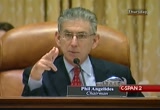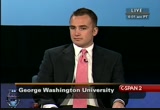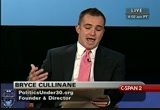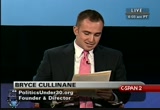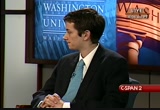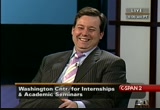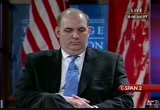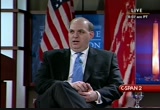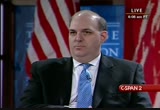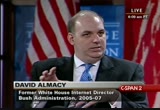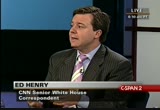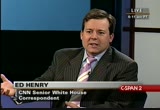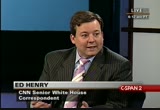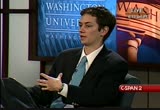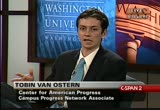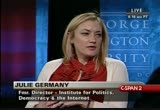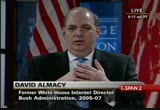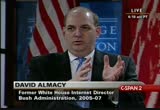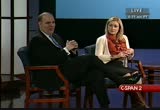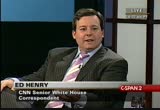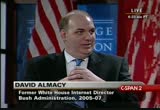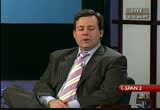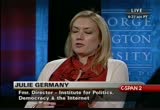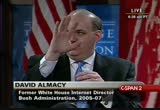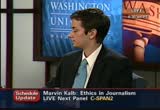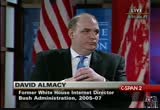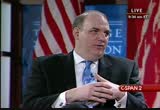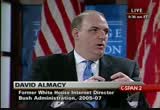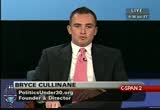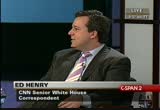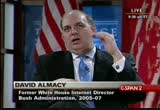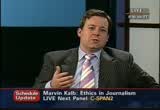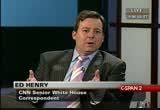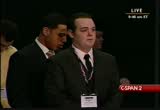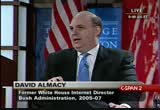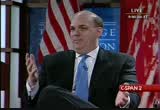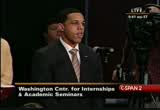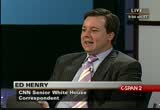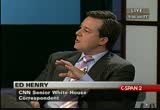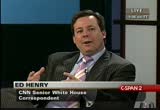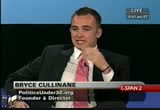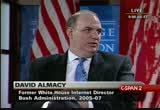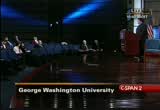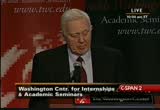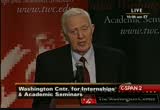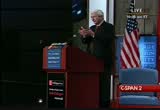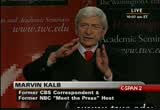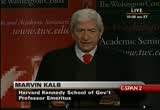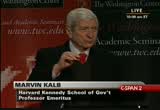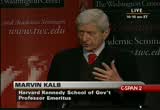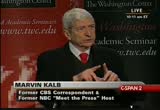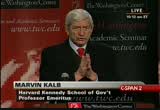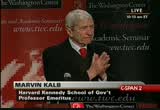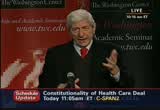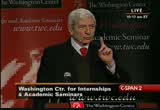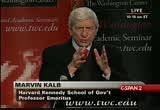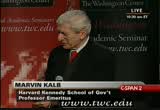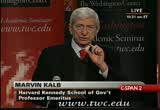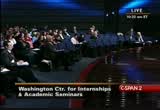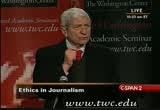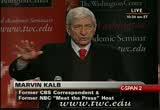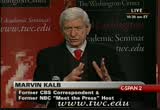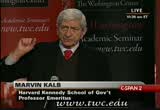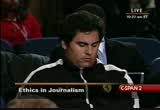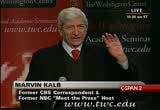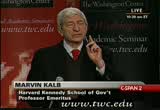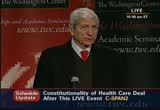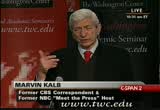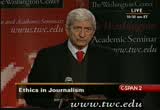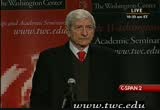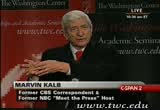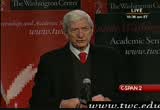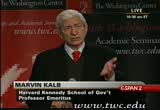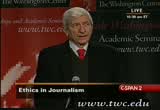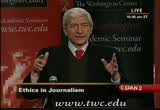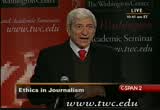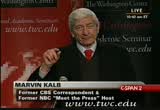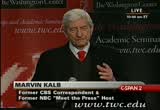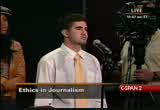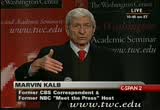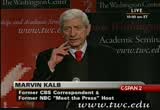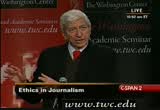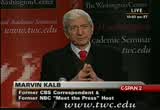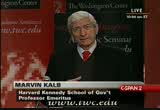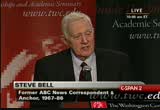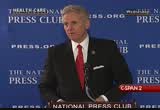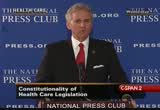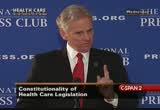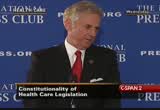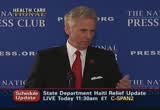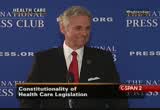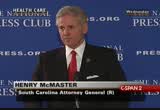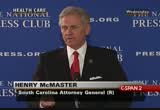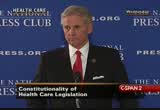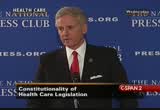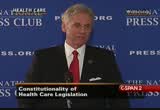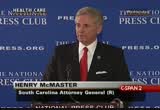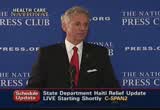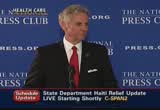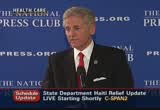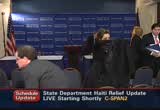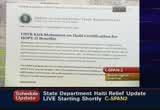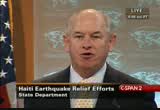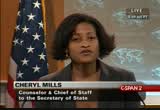tv U.S. Senate CSPAN January 15, 2010 9:00am-12:00pm EST
9:00 am
were out there. i mean, we know that there were many and many places, but i do think you've been very helpful in that respect today. witnesses, thank you very much for coming all the way here. thank you for your time, your testimony that it was extraordinarily valuable. and with that, the public hearing of the financial crisis in cory commission is adjourned. thank you all very much. . .
9:01 am
most most importantly, it was just two years ago, that bryce was a participant in inside washington 2008, the pursuit of the presidency, so he is a washington center alum, something that hall of you will be in just a matter of hours. so i'll go ahead and turn it over to bryce cullinane. >> >> how is everybody doing this morning? so we're here at the political
9:02 am
school management at george washington university, just four blocks away from the white house, literally at the center of politics. what are we going to talk about this morning? we're going to talk about new media and politics, and it's a wide subject. so what i thought i would do is i would start out with the landscape. so today, as americans, we have access to over 1 trillion websites. on your iphone, just on your iphone alone, you have access to over 65,000 apps. every minute, according to david almacy's web site and then according to youtube, there's 20 hours of video uploaded to youtube, every minute. the average u.s. teen, i don't know if we still have teens in this audience, the average u.s. teen texts how many times per month? 2,272 times. per month. there are about 200 billion e-mails sent every day,
9:03 am
actually, 90% of that is spam. and just this morning, ashton kucher has 4.3 million fans. cnn breaking news only has 2 million. yeah. so i know, adam is going to be disappointed about that. this is actually breaking news, con habmap n last night is putting the -- conan is putting the web site up. he said for potential buyers, the space measures 100 beneath by 100 feet by 32 feet, which is plenty of room for a few ton, designaledesigned for 1135, ande the best offer or trade for cold play tickets. with that, that is the media landscape we face with new media and technology. what we're going to try to do with this broad panel is try to
9:04 am
show you how to navigate the space, try to show you how you can weave your way through the expanding internet, and all of these new technologies. so first, we will start over here with tobin van ostern, a friend of mine who is now a network associate for campus progress, which is a project, first center foreamerican progress. he can be reached at at toe bin van ostern on twitter. his web site is toe bin van ostern.com. he went to g.w. here, he got his degree in international affairs an more importantly, he was one of the co-founders of student for brac barack obama. and interestingly enough, he's the only person i know who has played ping-pong with the obama twins. so -- and i think he lost too. i don't know. at henry here is senior white
9:05 am
house correspondent here in d.c. he has covered -- he's covered capitol hill for many years, before being at the white house. he has won the everett dirksen award for distinguished reporting. he worked at roll call for a number years as well. he can be reached at at henry cnn on twit early. and -- twitter. >> wow, i'm trying to catch up to ashton kutcher. >> and he is an avid new york yankees fan. >> wow. >> i guess you're a little bitter about the world series. >> here we have julie germany, who is the former director of the institute for politics, democracy and the internet. she has a degree from oxford and a degree from the george washington university's graduate school of political management. she has worked as a writer, editor and program manager for initial initiatives in korea, ukraine and the u.s.
9:06 am
she is founding board member of the young champions and the founder of mobile monday and this is official, she is the funniest tweeter in d.c. you have to follow herl a her ae g. definitely have to follow julie on twitter. and last but not least, we have david almacy, who is senior vice-president, digital public affairs for ettleman and before that he managed all of the white house communications, he can be followed at almacy or his blog which is capitol gig.com and actually, he was a professor of mine at the gfpm, an he halls the unique distinction of writing, producing, and directing both of the barney cams, which was george w. bush's dogs. two of them. so this is our amazing panel and we're going to go ahead and get
9:07 am
started right away. white house.gov is the center of on-line politics today and my guess for david, there are a lot of parameters that con strain white house.gov, that don't con strain businesses and non-profits. talk about some of those parameters. >> first. thanks for the invitation today. it's a pleasure to be here an spend time with y'all and discuss something that i really have a passion for and i think what's interesting, when it comes to the web, i think oftentimes, because it's so knew, i remind people i was only the third internet director that existed at the white house, so president bush i referred to as its first digital president, because elves the first one that began and ended his presidency online and president obama i believe has the ability to become the first social media president, so as we figure out what all that means, what happens online in a dot-gov property is different than what happens in a dot-com property.
9:08 am
there are many rules and privacy guidelines and regulations that govern how one can communicate with constituents and vice versa. so for example, one of the challenges that when i was there from 2005 to 2007, keep in mind that youtube was just founded in 2005. twitter was not yet around and if it was, it was right around 2007, so it was fairly. facebook was, you know, when i was at the white house, was merely limited to those who had college e-mail addresses. you had to be a member of a college or a higher education institution to be on the network, and so, for us, we were monitoring all of these things, it was interesting to us, but we didn't know really how it applied to governing, because it was so new and although youtube was founded in 2005, it wasn't until google purchased it that it really changed the landscape in 2006. and then in 2008, youtube actually surpassed yahoo! as the second more highest ranked search engine, so people are going to youtube before they're
9:09 am
going to yahoo! or other sites and of course, number one is google. so we were looking at all that and figured how can we leverage that in such a way we're not violating ego policies and guidelines, we were expecting people's privacies and we were adhering to the presidential records act which says all communications coming in and out of the white house must be preserved. we can post things to facebook, which is what the currents white house is doing, but in terms of earn gauging with people on facebook, they're right now trying to figure out, you know, from the comment policies an other ways, how can we archive that, so four or eight years from now or after a president is elect, can we zip that up, ship it over to the archives so historians for decades can look back at the conversations that we're having today. >> that's a good point. i wanted to actually jump in if i can, because i wanted to talk something you said, the white house being the center of the universe. i don't think it is. i think a lot of the points
9:10 am
david made about the, you know, kind of the constraints on official government websites, much different than what you're able to do in the campaign, for example, a lot more freedom there. and from the media standpoint, just as, you know, one time television journalism was basically, you know, three big television networks, with tabloids coming down of night at 6:30 p.m., it's completely different now and television and internet journalism, and so that basically, you've still got answer, cbs, -- abc, cbs, nbc, doing their thing. people forget every single night it's not as bad of 0 as some people macit out to be, but -- make it out to be, but yet it's splintered, you have obviously the cable networks, you also have can joe smith come out of college. one of you can grab a flip cam and start posing things on youtube and can be covering politics, covering the white house, covering congress. maybe it will not be as ground breaking as somebody at cnn or somebody at abc.
9:11 am
but you're out there. and it can be read. it can be heard, and i think the same way with websites, i think that, you know, the center of the political universe is not what aspect -- cnn.com, it was just redesign, every single hour and getting back, at 6:30 p.m., people used to wait, what happened at the white house today. it's constantly being updated at cnn, you know, on cnn television around the world, but constantly being updated on cnn.com, websites like politico, people jumping in and updating and the twitter thing, i we are when i was a kid, watching white house coverage and sam donaldson was the guy and he was always sort of shouting, a booming voice, shouting at ronald reagan, that was when i first started watching white house coverage and when i came to washington as a young reporter, i was at a press dinner one time and i think it was ted koppel was roasting sam donaldson and his
9:12 am
joke about sam donaldson, who i've since met is a wonderful journalist and person, ted koppel said if television had not been if vented, television would have gone door to door. well, i think in a way, with what we're doing with social media, journalists are going door to door, even if you don't see our report at a specific time on television, we're pushing it to you on your iphone, through the redesigned cnn.com. anderson cooper right now in haiti, if you're not following harriet miers on twitter, you should be, -- him on twitter, you should be, because the lights may go out on his show, he's doing two-hour live programs every night from haiti, but the reports continue throughout the night and are on cnn.com. and so in a way, we are going door to door now. because you don't just have that one at 6:30 p.m. getting that one report. it's just constantly being updated.
9:13 am
>> toe bin, how in this -- tobin, how in this world, like splintered media, where you can go to 50,000 places to get information, how are campaigns going to cut through that to reach potential voters? >> well, it's an excellent question. i think that what you'll see is and are already seeing, is campaigns choosing not just one, but to go through multiple raps, so now, each year, there so many to be a new tool or a new web site that they need to have a presence on. you know, facebook isn't the only social networking web site out there. you need to have -- if you're in an active campaign, you might want to have profiles on multiple social networking websites. twitter like david said didn't exist a few years ago and so the campaigns are seeing all these different avenues to get information out there and i think rightfully so, they're realizing that each presents a unique opportunity. a twitter account with 140 character limit something going to allow you to deliver a great policy news or something like that.
9:14 am
on the other hand, youtube allows you to deliver a video, a couple minutes long, giving great variety of information. so if it's the campaign or the white house, you're seeing them pursue different avenues and what's interesting to me is what's going to exist in a couplers, that -- couple years, that they might need to do. one example, the mcdonald campaign in virginia for governor, which was successful, he was a republican and he set up a nina account, and he used it to drive all of his social networking facility. that's in contrast with the obama campaign, which had actually tried to make its only social networking web site. there wasn't something for them to customize at that time, so as you see these larger campaigns try out new tools, the ones that work are going to be adapted and followed by smaller campaigns, and that goes all the way down to, you know, the county level. it doesn't need to be a presidential campaign or a
9:15 am
gubernatorial campaign. >> julie, you are advising a congressional campaign going into 2010 here. how much of your resources, your time, your money, your staff, do you put into new media? >> that's such a tough argument, because so many campaigns feel like they barely have enough money to get by in the first place. we talk a lot about the amount of money that's raised on campaigns. a lot of that is spent immediately. a lot of it is spent on grassroots activities, a lot of it is spent on television advertising, so historically, well, historically, within the context of the last eight to 12 years, the on-line politics community has really had to struggle to get resources within the campaign, financial resources. but also, human resources. to do all of the things, to update all of the sites and to engage people in real one-on-one conversations online. that they neighed. i think it's going to be really hard for campaigns from here on out to figure out where to focus
9:16 am
their time and their resources. i don't think there's one right answer for everyone, but i think that most people have realized now that it's going to take a lot more effort, a lot more manpower and money, and i think that they're going to turn to young are people, people in college and people right out of college, who are willing to put in a lot of hard work, who are savvy with the technology and who are really engaged in the political world and tier going to step up and fill those roles and probably not get paid very much money to do it, but be part of the political process and be involved in what's going on. >> but i do think what's changing and what i've seen change because i was working in the private sector, building websites for members of congress, both on campaigns and house.gov websites and senate.gov is new media -- first of all, in the past two cycles i've had more of a seat at the table, number one, in terms of the first psych em, it was hey, we're putting on a press release, slap it up on the web and the web person would be some person whose job it was to receive the e-mail, post it on the web site and it would be
9:17 am
done. there would be no way to disseminate it. that's web .10. it's the 2.0 stuff and the engagement sitesnd that helped launch those sites, so as that began to grow, the folks on the new media side became a little more involved in some of the senior decisions and now i think the concept of putting off into a separate bucket is totally the wrong way to go, because digital should be woven through everything you're doing, because you're reaching people in various ways. people say how will i reach this audience? we say are you on twitter, facebook, are you on youtube, e-mails? 90% of the people may go to the web site to find the information, but they're often link being the main websites and a new study just supported that so in terms of that level of credibility, that's out there, you know, weaving it through everything, so your campaign manager should in essence also be your new media manage early.
9:18 am
it's all at the same time and one note about the haiti thing that i thought was really interesting, so we're talking about, you know, mobile technology yesterday and a friend of mine who works at the red cross, i'm sure hugh all seen the note, the text, haiti to 90999, so the red cross in the past 36 hours, has raised $5 million as of 7:00 p.m. last night, through that mobile campaign. and so, the ability to raise money on line, i think, has had a huge impact on campaigns. and so, i think what we may be seeing is a shift from instead of putting money towards traditional television advertising, we are not initially reaching people and it's harder to measure, maybe towards mobile and other types of technology. >> all the time, energy handled money you would have spent to raised that $5 million, 10 years ago would have been cost prohibitive. now there's a big race in massachusetts, the big race for senator kennedy's old race and the republican, scott brown, really did a big internet push three, four days ago, raised something like $1.3 million in
9:19 am
24 horse. now the democrats also have a lot of money and he may have had a pretty big impact there, because not only was it money he can spend in the final week, but we're talking about it still. it created news stories, there's momentum there, he sales the polls are up 4 points, other polls saying he's down. but it became a news story in and of itself. because people said where is all this money coming from, maybe there's momentum and that's driving the coverage in the operate. >> switching a little bit from the professional brands of a candidate or a business to the individual, and this is open to anyone. talk to someone out there who needs to build their personal brand? what should they be doing to build that brand and defend and maintain that brand. >> i think a piece of it is the issue of trust. there's a fabulous researcher at mit named judith donnet who looks at how people build
9:20 am
identities. what are you actually doing when you go online, how are you interacting with people, are you socially grooming people, are you wishing them happy birthday on their facebook profile, are you retreating something they said that you think is witty, are you making him feel good. what are you doing when you're online, are you an active participant in some kind of a community. how are you participating in the internet and new media environment in a way that fills up your personal pro foil. for me, that -- profile. for me, that level of trust is very individual, it's very personal. it's hard to have a brand that people trust, but you can have a person that people trust. the person that people turn to for news, for information, for a recommendation on what to do after work today. or insights into what's going on in haiti and i think all of that sort of ties into what you do when huron line, how you -- when you're online, how you treat others online and how much time you spend engaging in the new
9:21 am
media environment. >> so pew calls the new ding at that time footprint and your digital footprint is comprised of two things, things that you public will be about yourself and things that others publish about you, so you can wholly control that what you public accomplish about yourself. so if you're blogging outwit at thing, what you're saying or doing online, if you're doing nice things online or dropping snarky things, people like to hide under fun names and they do that for a reason, so when they google the actual name, it doesn't show up in the results, but so things you're publishing about yourself and things others are publishing about you, and so, if you are a corporate brand or a person, you know, that could be, let's say if you're in college and you do something on your college campus and there's an article about you and your role in student government or community service or athletics or whatever it is, that is all forming an impression, so if i'm a future employer or if i'm, you know, seeking out information about you and google is returning the results that are relevant based on those search terms, i'm forming an impression
9:22 am
about you before i have ever met you. so you can't control what others publish about you, but you can certainly influence it. >> and also another way to look at it, for media in particular, but anyone, depending on your business or whatever, is the brand that you have, yourself, and the brand you have you with the company you're with, so my hand on twitter is that henry cnn and so there is even more weight behind it to me, because it's not just -- anything i post is not just about me, it's got the cnn brand on it. you've got to be aware of that and month just be posing kind of frivolous things or things that wouldn't be embarrassing, not just to you but to your company, and -- but i think even if you didn't have the company brand in there, people associate you with that company, or with that campaign, if you're working on the obama campaign, and if you just had your own name without the cnn at the end and you still said something stupid or ridiculous, people are still going to connect that back to where you were, who you associate yourself with, so you've got to be conscious, i
9:23 am
think very conscious of that digital footprint you're talking about. >> but i think the web has muddled that line between personal and professional and it's this personal brand entirely. on twitter accounts, it will say my day job on on p.r. and even on my blog, i have a disclaimer, because there might be something that i might take a position that one of my clients might be against or for and i say listen, those opinions are mine, so it might be influenced by what i do on a day-to-day basis, but a lot of people are trying to keep the lines very stark but it's difficult to do that. >> just to add quickly, an example of that is just now people when they're following bloggers, they're more interested in what that blogger has to say than necessarily the platform it's on. you can have a blogger be popular with one web site, switch completely to a new horse and keep a large amount of the interest and followers, but at the same time, they have to be cognizant of like what you just said, what brand they're associating themselves with as well. so if that brand or that new
9:24 am
plat norm is dramatically different, if that -- if they switch even from a newspaper to another, for example, that will impact their personal brand as well, so very much goes both ways. >> julie, the new technology in augmented reality, being able to, you know, hold up your cell phone and be able to digitally overlay what's around you, the question is, first to you and then the panel, how is augmented reality going to be used in campaigns and in politics? >> well -- >> or how can it be, if you can answer that question. >> right now, it's a really cool tool, because you can take your phone and hold it up and down load an app and get all of the reviews for what's going on around you. i mean, that part of it is really cool. it sound like something you'd read about in a sci-fi novel and it's fun to play around with. but can you imagine getting martha's vineyard to the point where you hold up your iphone and every time you turn a direction, you get a different political message from somebody? eventually, the more we use these tools, the more we're just
9:25 am
going to produce a lot of noise and a contrac lot of spam and we going to start tuning them out, so for me right now my interest in this new field of augmented technology, how can we use it to do something interesting, while people are still excited about it and what is that going to evolve into, so that we can jump on it when that next evolutionally steps occurs. >> i think your point about noise is important. there are so many different kinds of social media and whatnot, that people, users are very smart and are panel to figure out what they think is noise, what they like, speaking from the media organization, you know, if you send out a tweet, that is sort of frivolous or that is really not value added, you know, what's the point of kind of tweeting about things, you know, on twitter, that people can get almost anywhere. you know, they want to know something different, that you know, what's the white house correspondent picking up that you may not have seen, in a report just yet, it's just on
9:26 am
the surface, it's just a little tidbit, something like that and i think that if you just throw out things that they're not interested, you hear feedback pretty quickly an obviously for a political candidate, if you're just using the web to spam people, it's going to blow back in your face so quickly, that it's almost a self-correcting mechanism. >> there's another cool study by m.i.t. out there that looks at the issue of cognitive overload, which a lot of people tend to face, especially slightly older people tend to face, where they just feel overwhelmed. >> why i is she looking in my direction when she says that? >> overwhelmed and a bit shell shocked when they go online and they look at how people use dating sites and they found on-line dating sites that don't limit some of your choices based of off of personality, your sense of humor, or tastes, tend to overwhelm people so much that they spend last time evaluating the right potential mates for them, but websites that help limit those choices, actually
9:27 am
allow people, some way on some cognitive level to spend more time evaluating who is right for them hand i think we can apply that to more broadly to the world of information and political information as well. there is a lot of stuff out there, just googling the word politics, opens up endless possibilities for research and education and opinion, about what's going on online and people are going to turn to and hone in on sources that they trust. sources that have good social capital over a period of time. we're not a bunch of idiots using the internet. we're smart people and we're going to figure out who's producing good content and focus on the people, the individuals and the media organizations and block out the rest of the noise. >> that's why twitter launched the twitter list, so you can parse in terms of the con at the particular time that's coming in in terms of interest or consistent, what have you, there's a british scientist named dun dunbar where he basicy
9:28 am
talks about the fact that the human brain can only manage 150 relationships at any time and that may mean you could know 2,000 people hor3,000 people from childhood to present day, but in terms of your du nbar 150, we are all part of each others's dunbar 150, but if we know each other, we might move into our daily stuff, we lose track of folks and someone's birthday pops up. the brain can't imagine 10,000 facebook fans, it just can't and when you have a news need and stuff comes piling in, you have to decide. you might have sum up something or you can share something, but then you go off, you do work. you know, so -- and you can't be looking at that all day. maybe some of you are, but the human brain simply cannot manage that, so whether it's twitter, facebook, or whatever the medium is, you have to qualify what's of value and your brain makes that quick snap judgment in terms of over time, what's valuable and what isn't and what am i learning from this person or entity that is enriching and enhancing my life. >> one interesting way, going
9:29 am
back to augmented reality though, that it could impact that, is basically, it's the concept, that wherever are you're going, you're taking advantage of all the information that's out there. online, whatever. but the second step of that is that it's being cos customized tough. so the first places i heard about augmented reality was tad tech, where they were debuting sixth sense from mit and there's a projector attached up to an augmented reality device, and it would project information in front of you off of what you're seeing. if you go into the grocery store, you can pick up a box of zial and it would pro secretary on to the cereal the cost at other supermarkets or you could say i don't like this cereal and it has a high amount of fat and huron a diet. there's hall these different ways that you can custom highs it to make sure that that information is more relevant to you and i really do think that that's the future in the sense of taking advantage of all this
9:30 am
information that is out there, and what we're seeing now is just more and more information. and making sure that it is relevant to you, that it's customized to you and that it is what you're interested in, because as you mentioned, bryce, at the opening, you know, every minute, what, what did you say, how much is uploaded to youtube? >> 20 hours. >> 20 hours. so literally, you could never watch anything on youtube and you need to make that decision, what am i interested in or what's relevant to me. >> but to that point, i think one of the dangers is i used to work at c-span years ago and i remember, brian lamb every day expense his day going through all the newspapers and -- spends his day going through all the newspapers and i used to be mr. digital and said brian, why are you wasting your time going through the e-mails. he said what about the things i didn't know i cared about and i thought that was -- that was a moment, i said that's interesting. so i think what you do in some wales is you narfe pro focus things that you know you're interested in, but you kind of -- the act of discovery is
9:31 am
almost removed in some way, just by flipping through the web, just by searching through news sites or blogs, you learn something you didn't know even though you didn't know you were looking for it and you say oh, that's of interest to me and that's the power of the internet, it's compiled all that information, put it into digital foam mat, so it's -- format, so it's easily findable. i don't want to spend all day searching, i want to find what i'm looking for but while i'm searching and finding, i'm learning new things at the same time. so we need to be careful only subscribing to things that we know we're going to care about. >> tobin, some people predict by 2020, the main way we'll be accessing the internet is through hour cell phone, so i guess in the short term, how do you think that cell phone, that mobile technologies are going to be hulessed in -- used in 2010 for the election? >> that's a great question. you know, it's hard to predict, simply because it is always changing. you know, with the obama campaign, we did a lot of sort of organizing, with mobile
9:32 am
technology, so we told people about events in their areas, that kind of thing. then as you mentioned earlier, with haiti, you see a much better example of donating. the $5 million raised by red cross was done in $10 increments. 500,000 people donating through their cell phone, and so, you're having all these different factors come together, these new ways of doing things, at the same time that cell phone technology is dramatically expanding. blackberries are more common, iphones are more common, google has launched the andrid operating system and it's allowing people to get more personalized information and what campaigns are going to need to do is real highs that it's not the same as something like an e-mail little. it's not simply -- e-mail little. it's not similia list of names and information that you blast information out to. instead, there can be a much
9:33 am
richer interaction with people based on where they are and what they're doing. so if people are at a school and they sign up, we should track that, so that we can then give them information relevant to the school and i think campaigns in general, need to find ways to better utilize that. one noncampaign example is something that was just recently launched that allows you to track what congress is doing on your phone. it's an iphone app, and it's really interesting, because for those people that are interested in that issue, they might be walking around in the halls of congress or in the halls of the capital, rather and want to know, oh, wow, this bill was introduced even though i'm out of office and they're able to get all that information on their phone and so as these cell phone carriers and makers of the phones like apple, google, etc., they recognize this potential and are doing what they can to open it up, so that you can have the 65,000 applications, so there's a lot of potential out
9:34 am
there and the keep is that the campaigns need that they keep turning it back to the person and making it as relevant to them has they can. >> i think if you're getting an update on your phone, every time a bill is introduced in congress, you have to look at some of the on-line dating sites because it's pretty boring online. >> one of the things that the obama administration did, some of the studies out there urged on election day, it urged folks to go out and vote and what they were doing is track being the weather patterns across the country, so if you lived in a city where it was raining, you might be less likely to go out and you were in their database. you would get up to five texts a day, saying did you go vote yet, did you tell your friends to vote? and you can add your contacts and call you were friends and say hey, did you go vote yet, and so that turnout functionality and they show among younger audiences that the voting turnout was actually
9:35 am
increased because of that mobile technology. having said that, i think there's a lot of discussion about how much mobile and the internet really affected the race in 2008, but really, i think the ground game and the messaging and the campaigning all had a lot to do with it too. ron paul did a lot online, but obviously because of the nature of the candidate and some of the issues, he wasn't able to garner the national attention or support he needed to obtain the nod, so -- but if you look at the way that folks are connecting in that way, via mobile, it's certainly changing and i think as devices get more advanced we'll see the function amount change, content specifically created just for mobile online. right now it's web content that looks ok on a small screen and some people are investing money in it, but right now, it's pretty expensive to do some of that mobile technology, but there are a lot of folks doing it and doing it well. >> so the last question before we take questions from the audience, and people can start lining up, while we do this last
9:36 am
question, it's something that really interests me that i was reeding yesterday, was about the kay bailekay bailey hutchison cn and during the campaign, google found out that there were hidden search permanency terms in the html code in the web site and of a that he was a he said, she said between the campaign and election mall about how this would happen and there was non-disclose you're agreements and they never really found out who did it, but the web site was black listed on, you know, google's search, and so i'm just kind of wondering, you know, who sets the ethical standards of -- i mean, that's just about search engines optimization, but who -- and this is a big question, but who is setting the ethics and the standards and the best practices of how campaigns reach potential voters. and anyone wants to -- >> i mean, i think in large part, i'll just briefly say, you have for experience with it, in large part, i think it's policed
9:37 am
by the users out there, who will feel you know, that's a dirty trick, that's ridiculous. don't pollute our on-line environment with this or that. that might not be good enough. sometimes there might need to be more. but in large part, what we were saying before about how people online are smart, they're not just sitting there in their pajamas saying this horthat, they know when somebody is manipulating the web in a way that's underhanded and i think that's very risky for candidates and that's going to blow up in their face and that can police it in and of itself. >> so the example of that is the google bomb. basically the theory is that google returns search web results based on what's relevant so if you get a whole bunch of people to link to something and you get them to do that on their blog, then google, the technology will think it must be relevant, so if you will google at the time miserable failure, it would direct you to white
9:38 am
house.gov, because a lot of people out there -- this is the bush administration. >> this is in fairness to obama over here. >> but that's a good point, because google eventually said wait a minute, people are manipulating this. this all started because a guy had a friend who was applying for a job and he thought it would be funny if he lingualed the word talentless hack to his resume, and you would link that to his web site, the resume would come up. white house.gov, president bush's biowould come up, number one, and all of a sudden john kerry started popping up, this is during the 2004 campaign and you started seeing carter's biopop up there as well, so eventually google disabled it and said listen, people are manipulating the system, it's not what it's intended for, so there's certainly tricks like that. if you understand how google works and the web works, if you figure out how it works, you can manipulate it in such a way to cause a little bit of damage.
9:39 am
what's interesting about that, if you google some of the things today, in theory, white house.gov would still come up, because george w. bush's bio is still up on the web site, but if they move the pages around or when a new white house comes to town and they want to change all the links, all the links get reset, so that sets google back. we say wait a minute, things were there but they're no longer there, so that has long-term effects. >> i think the internet, like the force, you can use the force for good, for evil, you can train yourself into practices of the light side of the force or the dark side of the force, but if you spend too much time as a campaign or a company or an individual on the dark side of the force, eventually the ewolks are going to start throwing stuff at you and luke skywalker is going to come of after you with a light saber. it's a very individual thing, we're guardians and protectors of the internet. so what you do and say and act online is very important. >> and one last thing to add there.
9:40 am
what we see, we're talking about when they become destructive to the individual, so the person searching on google wants to get what's interesting to them hand what's most relevant. when that doesn't happen, they stay what's the deal with that and they blame google or whatever web site they're searching on and the companies are very protective of that, making sure the things work the way they're supposed to. so what we see is the companies themselves policing it, not because, you know, this is necessarily just their good natured and they're trying to be helpful, because they realize if we don't, everyone is going to leave us or they're going to stop using us, and that's how they make money, and so taking china, for example, just -- they just announced the other day that they're threatening to pull out of china completely. no longer on -- running its web site, simply because a month ago, the chinese military and
9:41 am
government hacked into a variety of google accounts of democratic activist and google was like this is unacceptable, we're already running a censored search engine. you have a huge country actually working directly with a company, this isn't, you know, through the u.s. government or anything like that. and so china didn't just come out a minute later saying whatever, you guys can leave. they didn't have a response for a day, and then they were like, well, anyone that wants to work here has to abide by our rules and it really didn't come back in a very competitive way and so you see this company acting on behalf of its users to protect them and to retain that and i think that will be the way going forward, where it's not a perfect system, but whenever something does become disruptive or destructive or manipulates their users in a way that they don't want to get information or to i want act with the -- interact with the westbound site, you'll see the company forced to step in and act.
9:42 am
and you'll lose people. >> there was an article this morning about this whole story hand of course the state department was quoted in the story. now you know your site has some weight, if google says we're not going to be in china anymore and the state department weighs in. that's the u.s.-china relations. >> all right. now we're going to our first audience question. try to keep them as crisp and concise as possible, so we get everyone back. >> good morning. my name is ingrid shapiro and i attend miami-dade college. my first question, but it's for mr. ben olstern and if possible, followup from mr. henry. i want to know why do you think during the 2008 presidential campaign obama had such a large number of supportsers and do you feel that that number has change after obama has been in office for a year, and why? >> sure. big question. but i'll break it down into a couple parts. i think there are basically two big reasons why obama had such
9:43 am
support amongst young people. and the first is largely because of my perspective inside the campaign and that is young people were valued. they weren't some extra or the of, ok, let's win this campaign, and it would be great if young people support us. there was a national youth group department which i was a part of, an whenever there was the campaign staff, there was always people associated with, specifically reaching out to young people. and if you think about it, that already exists with most other groups. you know, you have like a veterans outreach staffer on the presidential campaign, you have it for different constituencies, but often younger people were a little left behind on that, and really, while we may be different in what interests us or what gets us engaged orr what we want to do, what our schedules are like, etc., we're the same in that if you reach out to us, we're going to respond, so having someone focused or multiple people focused on reaching out to young
9:44 am
people is crucial, and i think the obama campaign recognized that and realized, you know, hey, if this person is 17, and they want to help out, we're not just going to ignore them. we're going to say hey, you can make phone calls, or let's make sure that if you want to volunteer on your campus, you can. so there was -- there was just the -- a higher degree of investment in younger voters than i think we've seen in a while. the other side of that is a lot of what obama talked about and what he said was appealing to young people, so you know, he's relatively young, president obama, he talked about issues relevant to younger people. when he was a senator, the first bill he proposed was a bill increasing the financial aid for students. just a few years before, he was paying of 0 student loans, so it was easy for him to relate to people and the flip side of that, of course he's chrismatic, so he was able to get young people out there interested, but simply holding a rally and getting people there wasn't going to turn out the vote.
9:45 am
it relied on that first step, which was making sure there were the staff presources hyped the matter to en -- resources behind the matter to engage the people and make sure they were able to come out and vote. >> you make a lot of good points. i think it need to be said that john mccain, having covered his campaign very closely, valued young people, valued their vote, was reaching out for the vote but the obama campaign was probably bet term at preaching out to them for two big reasons. two big ones i'll cite would be the kind of change that candidate obama was talking about appeals to young people, norad cam, more, -- more radical. more we're going to shake up washington. if you look at the specific bullet points of the obama campaign was speaking the seam language as a lot of young people and secondly, they were using the tools as you were laying out, you know, whether it's facebook, twitter, the social media, they were reaching out, they were using those tools to better connect with them. i will note that john mccain
9:46 am
now has one of the best or most followed twitter accounts in the world. at least on capitol hill. there was an article that he's got over a million followers or something like that. now why he wasn't doing that as a presidential candidate, i really don't understand. nevertheless, i think it also needs to be said that i'm not saying if john mccain was using twitter last year, 0 a year and a half ago, he would be president now. i think that would be an absurd notion. i don't think the social media in and of themselves are going to get you elected president, but i think when you put the whole package together, because by the way, i think david was making this point before about traditional media, traditional ground campaign, i think you both agree that you can't just focus on social media, just because that's the wave of the future, at the expense of making those phone calls, going door to door and i think the obama campaign sort of had the whole package. they were still knocking on doors and using facebook and just real quick, on why maybe they may be, and i stress may be
9:47 am
losing some young people is that the first part of what i saved. i talk about secondly the tools, first of all the agenda, on some of those agenda points, there may be some young people who might feel disillusioned now, some of the talk of radical change hasn't been delivered. if he delivers on a health care bill the next few weeks, which looks like he may, some of the minds may be changed. it's obviously still early in the administration. >> thank you. >> he'll going to add quickly, one thing i should have also mentioned is what was happening independent of the obama. so in the 2000 2000, 2004, 2008 elections, you saw an increasing number of young voting, so regardless of who was running that trend would have continued. he just did a good job capitalizing on that trend. >> good morning. thank you all for being here today. my name is richard, i'm from suffolk university in boston, mass, and my question is regarding -- is for mr. almacy, and it's regarding the text
9:48 am
messages that people are receiving from endorsements and from candidates. recently, our senate races caught national attention, and democratic leaders have been, you know, texting people who are on their list to go vote for the democrat he can candidate, martha coakley, yet, scott brown continues to rise in the polls. do you think the text message endorsements have great effect? >> that's a great question. a lot is to be -- it's not just what you're doing online, it's what you're doing off line that also counts. there's been interesting stories over the past few days about massachusetts, so i think even the fact that republicans even see a little bit of light of day there, that we could actually take ted kennedy's senate seat. there's a lot of of excitement around that and i think other folks in the state who might lean a little bit to the right are getting energized about that. other people in the country are getting energized about that, so i'm sure that more money is flowing in to that, so you know,
9:49 am
in some ways, text messaging is just pa way to keep in -- a way to keep in touch with your folks out there and your supporters. but ed's point about the ground campaign, i live in virginia that's mostly retired military, and i couldn't go to an event, whether it was a book festival or a farmer's market or even to the, you know, market, to buy food and there wouldn't be an obama table with volunteers out there, sending people to register to vote, and handing out buttons and stickers and all this stuff. so i think it's a combination of all of the above, just because you're doing things, whether it's on the mobile or on the web is not a replacement for some of the traditional ground game tactics. >> this strikes me as using technology in an old school way. this has been done with direct mail for the past 20 or 30 years, and then it was done by e-mail, for the past eight years and now they're moving to text message, so it's a very old
9:50 am
school tactic being applied to a new school technology and i'm not quite sure how effective that is. i think we review it as noise. we chuck it in the garbage, delete it. now if that text message came from somebody you actually knew saying dude, important election, go out and vote, we need you, i think that you would hold on to that and it might influence you to do something. >> but the one difference with texting, there's spamming regulations, so an e-mail, you get spam all the time, if you get a text and you opt out of that text, you still keep getting text messages, the fines for that are through the roof and because most people value their cell phone, it's within 10 feet of them 90% of the time, it's a way to directly reach people when there's an urgent need, whether it's get out and vote or get your friends to vote or what have you, or we neighed $10 right now, you know, can you do this, so that -- it's more like an immediacy, but it's a qualified connection to reach people independently, and most
9:51 am
people read text messages within minutes after they receive them. whereas e-mails, i don't know about you, but i have several unread in my g mail account right now. >> delete without reading. >> thank you very much. >> good morning. my name is sergio. with some of the recent advances touch as tivo, this is basicall the television based, do you think viral ads will become the new status quo in pol t or ads on the internet? >> i think they're fun and interesting, but i think viral ads depend on on the mainstream media to pick them up and give them more play. last week, a member of the mainstream media mark amateur, said he was no longer going to cover viral ads if there wasn't an ad by behind them, as if saying the ads weren't serious unless the organizations putting them out are willing to put a quarter of a million or a million dollars behind them in
9:52 am
paid television advertising, so i think that as interesting as they are, and i love them, i think that they depend upon the mainstream media a lot to get even more play. to actually go as viral as they can go, and as their creators want them to go. >> although i should -- you know, mark, i guess balances getting e-mails after the fact and ended up doing a followup post, where people are like, well, isn't that kind of biased towards television only. what if someone does a $250,000 on-line ad buy, as far as hulo ads, and he said yeah i'll put that up. tv is definitely dominating what's going on, but there is a little bit of interest in what about -- if you watch it, you get free content. people are more likely to watch it, they're not going to tivo it or walk out of the room on the commercial break, so it's a
9:53 am
small percentage of what's happening, but i think that percentage will increase. >> a viral ad will catch people's attention but then you go to a debate and you're an idiot, you don't know the issues, and you know, you misspeak on terrorism or health care or whatever, chances are that viral ad is not going to carry you to the election. it's going to be a part of it, but you need to also have some other important attributes. >> thank you. >> one more quick question. >> i come from washington jefferson college in washington p.a. there's been discussion and overworry and underworry about the media of the president. do you think the president should be this exposed out in the media and in the public or do you feel that people are
9:54 am
overreacting? >> i think the media likes to make a story about how overexposed barack obama is. i'm not sure that regular people really care that much about it. if the media hadn't been the ones talking about it so much over the autumn. >> as members of the media, i have to say, i mean, i could see both sides of this, but on your -- the one main point that is the media driving it, i talk to a lot of real people back home oral not just in the beltway, so are saying of time i turn on a tv, obama is on all five sunday shows, then he's on the cooking channel, then he's on espn, talking baseball or whatever, and that's fine. you know, on the other side of it, i will say i think there was a lot of, you know, pundits, overdoing that he was over exposed, because you know, frankly, it's a free country, and if he wants to use these new media, he has that ability to do it. it was effective for him in the campaign. but i think there are diminishing returns sometimes
9:55 am
and i think we saw in the health care battle earlier, he was on a lot and he wasn't really moving the needle. he wasn't moving it forward. he kind of pulled back for a while and was not out there every single day and now it looks like he's on the verge potentially of a victory. so i mean, i think he's slated to do what he wants and i think they're still seeing in the white house that sometimes flooding it and going out there everywhere, can move the ball forward for them. other times, they've got to pull back. a funny side note is that the white house has sort of turned this around on the media and the president hasn't had a full fledged news conference since july or june. >> six months. >> and eat been getting some -- he's been getting some pressure on that and robert gibbs a couple of times at the podium said you guys said we were over exposed. we just wanted to have a news conference. there's a push and pull and i think there's a balance for any white house. i don't think we should just knee jerk say he's over exposed.
9:56 am
if he thinks that's what he needs to do to get his message out, whether it's on afghanistan, health care, the economy, he's free to do that, but i think the would you say also has learned over the last year that there are diminishing returns sometimes and you can't be out there and everybody fake every single day. >> and not have action to back it up. >> right. getting back to a broader point. you can just keep talking about health care, but you know, if there's not any movement on it, if your democratic colleagues on the hill are not moving the ball forward, they finally are, they miss deadline after deadline for the last six months or so, but now they're starting to meet the dead lines, there are two bills that they're trying to merge, there's some substance behind it. earlier, there was a lot of talk, a lot of talk, democrats on the hill were struggling to get it moving. now if there's something they can rally behind, him getting out there and messaging it might be more effective. >> just to finish up, a last quick question, we're going to do just an opinion for each of the panelists. i think it's really interesting that if this was you know rks
9:57 am
january 15th, 2000, that aol and time warner would have just merged. and i was reading a lot about this on the "new york times" yesterday. $350 billion is what it's estimated that merger was worth and people said that it was going to change the landscape of the internet, it was going to change the way that news was reported and all of this. and if anyone would have said, you know, 10 years ago that it would be just a flop, no one would have believed you, so my question for each of the panelists is, what do we believe today, that in two years or five years or 10 years is -- people are just going to say i can't believe we believed that. >> about technology? >> yeah. gentleman. >> that's deep. >> after -- everybody found their facebook predictions. >> well, i think, and i don't know, we have to look at how technology is advancing that. i mean, things that took two years to create a year ago, will take half the time today.
9:58 am
it's moving -- history says that psychology is advancing -- that technology is advancing so rapidly, so this concept of convergence, this concept of everything will be touch screen and you walk in your house, there will be no more television, computers, everything will be touch screen and we're seeing some of that already. microsoft came out with a table a couple years ago, so you know, skype has become the example where we can talk online on our computers, but still, a lot of the technology in how we interact with each other is a little bit clunky. this concept of convergence was pitched. tci cable was asked about pulling out on to the information superhighway and he said i feel like we're still sitting in the driveway, so that was about 10 years ago as well, so i think we won't be as far along as we think that we will be in five or 10 years with that. >> and what you were saying
9:59 am
before, the prediamondbacks will be the idea 2020, most of your web use will be on cell phones, i don't believe. i think people value having all kinds of work space. on the fly, it's great to check a baseball score or other things, but i still think there's a value in having more than a little screen. >> it's interesting that our television screens get bigger an our cell phone screens get smaller. >> tobin? >> yeah. it seems like a dangerous thing to predict. i'll give maybe one or two examples of things that i think could go either wave. i think that with the examples you give, and another great example, might be myspace.com, which valued at hundreds of millions of dollars. several years ago now. losing people dramatically, is i think the key is that they need to adapt to the new technology, and adapt to things that are changing, and i think that the companies are seeing that the
10:00 am
way to do that is by giving people the platform to create their own content and their own unique ways of using something, so with the iphone, the iphone would become obsolete or at least, become identical to every other phone if they didn't have am cations. nowadays, that's the number one reason why people are picking phones, regardless of -- iphones, regardless of carriers, so these companies need to make sure they allow people to interact with content and the products in unique ways. : and seriously thank
10:02 am
10:03 am
clear the stage, i just again want to reiterate how much of a pleasure it's been this week to have someone i think you've all enjoyed serve in the role as faculty director for the inside washington program this week. he's been able to, i think, meet all of you individually and share some wonderful stories in his career as well as his insight. and it's my pleasure to again welcome to the stage to introduce our next speaker, professor emeritus at ball state university and/or faculty director for inside washington 2010 professor steve bell. [applause] >> thank you, tony. and it's my pleasure to introduce an old friend and a friendly competitor from many
10:04 am
years when i was at abc and he was at cbs, marvin kalb is the james clark welling presidential fellow at george washington university here. marvin is also the edward r. murrow professor emeritus from the harvard kennedy school of government. and he appears frequently on npr and on fox as an analyst. marvin had a 30-year career at cbs and nbc. he was the chief diplomatic correspondent for cbs for many, many years. prior to that he had been the moscow correspondent for cbs. and an interesting thing for those of you who are college students is the fact that marvin was actually in cambridge studying for a ph.d. when he got an opportunity to go to moscow for the state department.
10:05 am
and a year later then he was signed on by cbs, the last correspondent hired by edward r. murrow. and so he went right from academia to the firing line and was a brilliant cbs correspondent for so many years. later on nbc he was the moderator of "meet the press." two peabody awards. that's the biggest in broadcast journalism. dupont prize. he's written 10 books. two of them were novels. one of them was cowritten with ted koppel. and it was a great spy novel. but i asked ted one time what was the toughest thing writing the book. he said the sex scenes. after i had -- after i had read the book i understood why. [laughter]
10:06 am
>> marvin is currently working on a book on the american experience in vietnam. and we're delighted to have him here this morning as one of our speakers. marvin? [applause] >> thank you. let me start by telling you about the sex scene. [laughter] >> ted and i were working on this book for about a year or two and always delaying handling this problem because both of us felt rather uncomfortable. and yet our publisher was telling us that if we really wanted to make it big, you have to have a sex scene. he called it the o.s.s., the obligatory sex scene. so i said to ted, you're so much smarter than i, why don't you write it. and he said, no, for, you're taller than i am. why don't you write it.
10:07 am
[laughter] >> and i said well, you have four children. i only have two, which means you're twice as good at it. so why don't you write it. [laughter] >> so finally he wrote it. and he gave it to me. it was awful. it was really awful. so i didn't call him back. and he called me, and he said is it that bad. i said yes. well, i'm not sure what happened with it. i think what happened was that when they embraced, we almost like a camera turned to the window where a breeze came through and that was that. so the book sold maybe another 20,000 copies less but what the heck. ladies and gentlemen, i'm happy to be here. i thank you very much for the invitation. how many of you have been
10:08 am
journalists either in college, secondary school, summertime? any of you? good. okay. then you may be ahead of the track from where i am because i've been asked to speak about the ethics of journalism. and as i was driving here this morning, i realized that my fundamental problem is that i no longer know what journalism is. so you can all think that you've got a grasp on it. i thought i had a grasp on it. i no longer do. and the reason that i don't is that the craft has changed so dramatically in recent years that it's impossible to know exactly what it was, what it is, and where it is going. and i admit to my difficulty upfront with you. when steve and i worked in this business, i think we each knew
10:09 am
who we were and what our responsibilities were. today i find it very difficult when i watch cable news particularly to find out who the journalists are. for example, can i say with both candor and certainty that larry king is a journalist? i cannot. and yet news is committed on his program. there are people who come onto his program and actually make news. so you can say well, if news is made there, why isn't he a news man? and in a way he is. but is that the same thing as ted koppel or steve bell working as reporters covering wars, covering political campaigns and the answer has to be no. there is a very marked difference so then what is the difference?
10:10 am
how is one to define who the reporter is? and until you can, how is one to define a set of ethical values that are ascribed to that kind of work? if you are covering a war, there is a certain kind of ethics built in to the very craft of war reporting. likewise, politics. but if you are the host of a program or if you have spent most of your life as a politician and then you lose a race, what happens? these days you generally go into television. the former governor of alaska is now going to become an analyst on foreclosure. -- on fox. i do some of that for fox so i have to say immediately that i'm
10:11 am
not sure that this represents an increase in the journalistic value of fox but it does probably almost certainly, in fact, add to the ratings potential at fox. therefore, what we're talking about here is bringing on personalities, largely political personalities, who have done a great deal of work in a certain business of politics into a world of communication, into the world of the media. and then we somehow or another believe that, therefore, they become news people. well, forgive me, but i reject that. i don't think it's right in any way. but there are ethics involved in the craft of journalism. and i'd like to talk to you a little bit about that.
10:12 am
does it reporter have a right to report everything that he or she knows? if a reporter is covering as i did, i think, steve i'm not sure -- covering let us say the war in vietnam, many years ago, and you came upon a bit of information, i know this for a fact, i will not mention the reporter's name, a television journalist well-known who walked into a bar in da nang and met there with a young american pilot, who told him simply because he recognized him as somebody he had seen on television -- he told him, sir, you know, it's very interesting. tomorrow morning we're going to go off on a bombing raid over hanoi.
10:13 am
at the time the u.s. was not bombing hanoi. and the president was saying we don't want to expand the war. and yet here was a young pilot saying, tomorrow morning i'm going off to bomb hanoi. what is the ethics involved in the reporting of that story? let me suggest something and when you get to the q & a you come in with your own point of view. on the one hand, a reporter has most of the time, most of the time, a right to report the information that he or she has. so long as you -- so long aou are persuaded that the information is accurate and you try to present it fairly. but does that reporter have a right to put out the information that this young man is going to
10:14 am
be taking off in an american fighter plane the next morning to bomb hanoi? i would say no. it's a heck of a good story. you're breaking something quite new. the u.s. is expanding the war and beginning to bomb the capital of north vietnam. this particular reporter did not report that story. i think he did the right thing. let us say in another circumstance, less dramatic, a politician on capitol hill -- this did happen to me following a meeting of the center of foreign relations committee came over to me as we were all walking out and said, marvin, this is off the record but let me tell you that the democratic majority is going to try to move a resolution condemning this particular aspect of policy. i said well, thank you, senator. thank you very much. i walked away.
10:15 am
he had said this was off the record. now, we are all clear -- maybe i ought to pause here. off the record here is you are not to use the information at all. it's off the record. there is then on the record which means go with it as best if you wish. then there were two intermediate categories. one is background and one is deep background. and if a government official in this city says to a reporter, this is on background, what the official really means is use the information but don't quote me. you can say u.s. officials, plural. you're getting it from one person, u.s. officials say x, y and z. you can use that formula. that's acceptable. if the source says to you, this is on deep background, that
10:16 am
means in effect you can use the information but you use it on your own. you can ascribe it to no one. in other words, you write a sentence that is -- it is the feeling here in washington that, then you use the information. if you wish to do that, remember, you're assuming the information then is right. wisely you would have checked it beforehand. now, when that senator gave that to me, i assumed it was off the record. and i walked away. now, i did not use it in my piece that night. only to get a call from him the following morning saying, why didn't you use that? i gave it to you to use. i wanted that on the air. and i said, but, senator, you said it was off the record. oh, he said, don't be hung up on terminology like that. if i'm giving you information, use it. ah, but then it's the reporter's
10:17 am
responsibility -- should it be the reporter's responsibility to figure out whether the information is of a sort that he the reporter can figure out and use? last night i was -- i'm absolutely hooked on old mysteries. and i was watching a movie "north side 777," jimmy stewart. it came out about 50 years ago. it is about a reporter who approaches a story at first with extreme skepticism, writes it but doesn't think it's right at all. the information that he's writing is right. but he doesn't think this particular person is innocent. and then halfway through the movie he becomes persuaded that he is innocent. then he begins to write stories geared to proving the innocence
10:18 am
of this man, but he doesn't know that the person is innocent. he's just writing it. did he as a reporter ethically do the right thing? no. because he was writing a story and putting his name out on top of that story suggesting that he believed this person was innocent when he did not have the evidence that he was. so you can argue very easily that the ethics comes in with the knowledge that the story is absolutely right. ready for broadcast or newspapering. but is that enough? is there not a moral dimension that goes along with the reporting of the news? don't we also have an inner
10:19 am
moral compass that says this is really beyond the pale. we really should not be going down that way? and all i can say is that over the years, as the distinction has broken down between a clear-cut reporter and a cable host, all under the umbrella of the media, it's producing enormous confusion in people's mind and i don't blame them. it's understandable that there would be the confusion because you're not sure of the product you're working with. if you get to a certain point where you feel a story isn't right, you should simply tell your story, i can't do this. example, during the iran hostage crisis, there was a moment early
10:20 am
on in that crisis when six americans were actually not being held at the american embassy, held by revolutionary guards of the iranian regime of the moment. but being held in the canadian embassy. it doesn't seem like a big deal now. but it was then. there were six lives involved. i had that story and i think dick of nbc had the story. i'm sure somebody at abc had the story, too. but i called up cronkite that night and said, this is the information. it's absolutely accurate. but i can't do this story. it's beyond -- i don't think it's right to jeopardize the lives of these six people. i said, however, you know, you guys pay me. this is the information and do
10:21 am
what you wish with it. and cronkite thought about it. really for 2 seconds before i even got off the phone, and he said, we're not going to do it. let it sit there. somebody else can have it. we didn't do that. we didn't do that because we didn't feel it right to broadcast information that might jeopardize lives. and i think that becomes a cutting edge issue in all reporting of national security. the ethical line there is if there is a danger that you may jeopardize lives, you don't go with the story. and i think that makes very good sense. and i think by the way that most reporters do that. "the washington post," a major newspaper here in d.c., comes upon information regularly that it does not publish. and it does not publish the information because it doesn't like good stories but because it
10:22 am
doesn't feel it's right to go with it. and how do you define that sense of right? is -- it's very hard to figure out and i acknowledge right as i did in the beginning that we're dealing with categories when we talk about the ethics of journalism that are very fuzzy, both on the ethical side and on the definition of journalism side. let me now speak for just a couple minutes about one subject i care very deeply about. it's connected to what i've just said. and then we open it to your questions. i've been a journalist for an awfully long time. and i'm very proud of that profession. i've spent a good many years overseas.
10:23 am
after a while you get to know those countries that are free or relatively free and those that are dictatorships or dictatorial in nature. who call them authoritarian for a moment. and you can tell by the way which is which by just going to a local newsstand. walk up to a kiosk and just look at the newspapers in front of you, the magazines, and i submit that you can tell almost immediately whether that kiosk exists in a country that is free, sort of free, dictatorial, or sort of dictatorial. how? you can take a look at the newspapers. they all tend to look alike. they are all reporting essentially the same story and not just that, but reporting it the same way.
10:24 am
and on the faces, the covers that exist on magazines and journals, there are always the faces of the leaders of a dictatorship, almost every single magazine will have the picture of dictator one. whereas if you go to a newsstand in this country and you can buy a tabloid which will have one kind of headline and emphasis and let us say the "new york times," which will have another one, you can see immediately by the face of journalism what the essence of the political system is. and i maintain that a free press, a free, vibrant, occasionally even irresponsible press is the essence of a free,
10:25 am
vibrant and occasionally irresponsible democracy. and that the two go hand-in-hand. if you have a free press, you're going to have a free and open system. and if you begin to clamp down on the press, you're going to find that your political freedoms are going to be cut down as well. and my concern at the moment, particularly after coming from such an elegant and eloquent panel as you've just been exposed to -- i represent obviously a different generation but also a different vision of journalism. to me it is not sacred but it is a calling. it is something very special. it is as i've said a moment ago for me the essence, literally the nectar, of an open and free society. and when -- due to the explosive
10:26 am
force of the new technology, we have a journalism that is much wider. it exposes more people to more information than we have ever had before. and that is a good thing. it is at the same time information that is presented that is very thin. it goes across the spectrum but not deeply. it goes across the spectrum in a shallow way. and it also goes across the spectrum in a way that at the borders, there's a fuzziness between substantive content that is real and political opinion that is opinion that should be in a straight news story. it should not be in a straight news story. so i worry deeply that where we're going in journalism today
10:27 am
is to lose our soul in pursuit of profit that is understandable and that may be unstoppable given the way revolutions take place particularly in technology. but that doesn't necessarily make it a good thing. and because you are all -- because of your age, going to live with this for the rest of your lives, it becomes your responsibility to make absolutely sure that you're not losing the soul of the business, which by my lights is the soul of a democracy. so i am finished with my basic pitch here but we do have a lot of time for your questions. and by the way, we can wander afield well beyond anything i've been talking about. [applause]
10:28 am
>> if you want to just stand up, i'll recognize you. oh, there's a microphone. oh, right in the middle. >> i'm andrea hall from north carolina central university. you discussed the idea of ethics. in your opinion have ethics changed over the years since the beginning of journalism? >> as ethics changed over the years? and the answer is yes. because while -- as i was trying to say before, while i might have had a standard of ethics that i would have applied to a news story in the 1960s and '70s and '80s, that might necessarily be appropriate to judge a news story's value today or the performance of the reporter in getting that story. so the ethics have become a bit fuzzy along with the definition of journalism. so has it changed?
10:29 am
absolutely. should it change, well, this is, you know, a flight of fancy. so long as the journalist knows that he or she is presenting information believed to be accurate, presenting it in a fair way, i think the ethical impulse is to go with the story so long as it doesn't affect -- so long as potentially it might not affect human life in a military situation. >> thank you. >> thank you. >> hello, i'm tyler mosley from kentucky. >> from where. >> poplar college in kentucky. a few years ago a there was a 14-year-old girl that went missing. a couple miles her body was found and there was a reporter on the scene who immediately aired images of the girl's body.
10:30 am
the parents hadn't yet been alerted of the situation and the images that were shown were not very easy ones to look at especially for a parent. what do you feel ethically the reporter should have done in the situation? i understand that they want to be the first one there. but i feel that the parents should be told first. >> wow! again, by my ethical standards, i probably would not have run the pictures. i might have selected a picture that conveyed the essence of the awfulness of the story without showing too much guts and gore. look, if you write a good story you're going to convey the
10:31 am
awfulness of that kind of event. and i don't think it is necessary to go too far with the pictures. there used to be an issue that came up on television all the time, in my day, and that was since our major programs, "cbs evening news," walter cronkite, went out at 6:30 or 7:00 in the evening and they'd be in the middle of the country at 5:30 or 6:00 which was dinner time so walter was always asking a question if we had a really gory picture do we put this on while people are having their dinner? and the answer quite often was no. now, in recent years, and again, you know, i don't want to give you an old foogy version of reality, but increasingly there's more of the gore on
10:32 am
television that is acceptable stuff. more newspapers are putting in gory pictures because that has become the acceptable thing. more stories about the private lives of public officials are in newspapers now because that has become more the acceptable thing. is that the right thing to do? that's a separate issue these days. it's almost anything goes. but i appreciate your dilemma. i thank you for the question. >> thank you. >> hi, i'm zach from lufton, texas, and yesterday my small group went to roll call and we were in the meeting with this reporter there at roll call. and i posed the question, if lives were at stake, would you publish a story? and his response to me, which shocked me, was that's not my job. that's not my problem.
10:33 am
and do you think it's because of reporting like that that has contributed to the negative perception of the media in recent years? >> are you asking specifically whether as a reporter i have a responsibility to judge the impact of my story when it's published? >> well, that and do you think -- that mindset that has contributed to the negative perception of the media today? >> yes, of course, it has contributed to the negative perception. alas i'm old enough to remember the time when a vice president named spiro agnew who was the first vice president for richard nixon did a series of broadcasts attacking television news. and he was the first to give that idea of the media cachet,
10:34 am
the media -- that word that embraces everything from journalism to public relations. and he also conveyed the impression that the people in the media were really a special, elite group of northeast intellectuals. he didn't quite say harvard but he meant it. and as if -- if you come from the northeast and you are a graduate of harvard, that that makes you un-american. and he conveyed that impression because there was the beginning of strong opposition to the vietnam war on the part of the american people. and they blamed the reporters for instigating that reaction. i think it was since that time
10:35 am
that the public perception of the media shifted from essentially positive to, unfortunately -- i don't want to say essentially, negative, because i don't think that's true but certainly a negative impression is there. and the more that journalists go for the juggler, go for the headline, go for the whoops, gotcha journalism, in my view, the more there will be a diminution in the degree of public respect for journalism. and it goes back to my central point again. if journalism loses its centrality, its importance, its purpose, we all suffer -- our political system is sure to suffer. so somehow the journalist has
10:36 am
got to get his act together and i think the sooner the better. and i thank you very much for the question. >> good morning, professor kalb. i'm madison and i'm from suffolx university in boston. >> i know it well. >> how would you change the media today to perhaps make it more ethical and abiding by a stronger moral compass than what it has? >> well, that is the toughest question to answer because it puts me in a position of having to acknowledge what deep down i fear. and that is that the combination of the new technology -- and i don't want to repeat -- i respect it, and i appreciate it and it's there. but the combination of the new
10:37 am
technology and the drive for greater profit produce an explosive negative force which undermines the purpose of journalism. and likewise introduces into our democratic system a coarseness and an unfairness that we see expressed on almost every talk program that we listen to. i do not see at the moment how journalism makes its way out of this. honestly, i don't. i wish i did because it would leave you all with a more upbeat sense. and i would like to do that. but i have to be honest with you. i don't see it at the moment. maybe it will happen. i hope it will happen. for the reason i've already said 10 times. i hope it will happen. i just can't find how that's going to get started.
10:38 am
unless all of the young journalists who come in filled with idealism who ask their editor, why, if the editor is moving them in a direction they feel is uncomfortable. because if it's uncomfortable, there has to be a reason for that. maybe you're wrong in even raising the question but at least by raising the question you air the problem. and i think that in and of itself is an advance. the more we can discuss this, the more we can have these sessions, the better off we will all be. because people will become more aware of the problem. and then ask themselves, wow, am i losing something? is there something i ought to be doing? as a citizen? so it's a problem for everybody.
10:39 am
it's a journalist problem. it's a citizen problem. it's a national and political problem. >> thank you. >> okay. >> jonathan azar, arkansas state university. i want to know what do you think the impact of watergate had on investigative journalism most specifically the word that woodward and bernstein did to lead to the downfall of the nixon presidency? >> wow! well, i have enormous regard for both of those reporters. and bob woodward continues to amaze me. he continues to produce these extraordinary books. presidents and secretaries of state and defense -- when they're in power, they are all very critical of woodward. but when they leave power, they all read those books and try next time he calls to be
10:40 am
available and to share some of their stories with them. what watergate did with the reporting of woodward and bernstein did was make the often tedious job of investigative journalism exciting. because the stories themselves -- each one of them was not a blockbuster. they were little pieces of a large jigsaw puzzle of political chicanery. they didn't have the story. it was a gut sense on their part that this is going to up pretty high. and it may get to the white house. but if it does reach into the white house, before we print that, we really have to have the evidence. and so on the part of the editor and the publisher of the
10:41 am
"washington post," it was an extremely difficult decision and a gutsy decision. because sometimes the evidence was not absolutely there. it seemed to be moving toward a conclusion, but it wasn't there. and then, of course, the u.s. government at that time under president nixon asked the attorney general to put out an injunction to stop "the washington post" from publication, which could have been a direct interference with freedom of the press so the supreme court ruled the right way a week or two later. it all happened very, very swiftly. the impact of the story was enormous. it led to the toppling of the government, to the resignation of a president, two steps of
10:42 am
almost certain impeachment. it put the country into a terrible tailspin. and i would submit that we're still not out of that. and it ignited in young journalists the belief that they could automatically become a woodward or a bernstein. so on the one hand, the excitement into doing investigative reporting is very good. the overexcitement that you could actually be woodward and bernstein overnight was very destructive. at the shorenstein center at the kennedy school we give out a prize every springtime to the best of investigative reporting. and i have to tell you that with all of the economic and
10:43 am
technological problems now facing newspapers across the country, i am always so happy to receive 100, 110, 115 submissions every year, really first class investigative reporting, first class. and then it becomes extremely difficult for us to have to make a selection as to which one of these is the best. and i always -- when we get down to the last five, i always say you can choose any of these five. it almost doesn't matter. so we give out five prizes. but my point is that investigative reporting is still there. it is essential. i'm delighted it continues. its impact -- the woodward/bernstein stories were profound, really profound. there have been many books written about them and there'll be many more. and i hope even more movies.
10:44 am
i mean, just part of our culture. it's important. thank you. >> thank you. >> good morning, my name is alex from suffolk university. >> hi. >> do you think with the emergence of such media as c-span is it now unethical for congressional leaders to hold negotiations of major bills off the camera? >> this is an issue that has come up and has been pushed by the republican side up on capitol hill in order, i think, to grab on to something that c-span would like to very much to do. which is to get its camera in everywhere on capitol hill. but on the other hand, there is clearly a political motivation in all of this and an embarrassment of the president is also a political goal. i answer that on two levels.
10:45 am
on one level theoretical and on the other level practical. on the theoretical side i believe there should be as much courage and all committee meebz ought to be open to the public, therefore, open to c-span cameras. and as far as that goes, fine. however, that is not the way legislation is made. it's very much like the production of sausages, which you don't ever want to see because you'll never eat one. legislation comes about in a formal way, which is more or less what we see. but most of the deals are made privately. and they are made privately because they are deals. you take this, i give you this.
10:46 am
look, the senator from nebraska got a great deal for his people. senator nelson, but he might have -- he was in a position -- one senator with senator lieberman from connecticut, in a position to destroy the healthcare bill. now, can you actually take a picture of senator reid, the majority leader pleading with senator nelson, you know, ben, i'll give you this if you give me that? as a practical matter, you're not going to see that. but that is at the heart of politics. so the camera can expose a lot in form. and a good part of it really conveying the -- some of the essence of politics but not all of it 'cause politics is deal-making. and deal-making is done largely
10:47 am
on a private basis. >> thank you. >> thank you. >> good morning, sir. my name is patrick from suffolk university in boston, massachusetts. >> right. >> during president obama's campaign, a famous quote was taken from the first lady michelle obama during a speech. and she said, quote, for the first time in my adult lifetime i'm really proud of my country. now, do you believe that this quote was taken out of context? >> yes, yes, i do. and it was -- it was taken out of context largely to make a political point. to be as damaging as possible to the obama campaign. now, who would want that to happen? obviously, the republicans running against obama. that becomes, unfortunately, increasingly part of american political campaigning.
10:48 am
it doesn't make it right but it does make it obvious. it's just the way it is. what i believe she was saying and as she explained it later, as an american black, she suffered, she felt, considerably in different ways. which she has ticked off, and, in fact, her husband is ticked off in a more direct way than she. but talk about that. -- she did talk about. she was simply saying, wow, something that is happening now is so extraordinary that and then she overstated the case. but do i believe that was the first time michelle obama was proud of her country? no, she was probably proud of her country than that and for many more reasons than that. just listen to her talk about her family and about her father working for the post office.
10:49 am
no, i think she's a very proud american who in her choice of words and in the way it was picked up perhaps overstated something. >> thank you. >> okay. >> hello. thank you for being here. i'm lydia woods. i'm president of student government association at miami-dade college. i see that you are a good man and a well respected journalist but have you always been able to stand solid on your ground refusing to do a report if it's against your ethics and could saying no to certain reports jeopardize our jobs as future journalists? >> i thought about this many times. i would like to say that i think most of what i have done over many, many years was professionally sound.
10:50 am
the motivation was clean. i was, as steve can attest, a very competitive reporter. but i think at the same time reasonably good. and i hope fair. but over the years i have thought about one thing, and i'm still not quite sure of the answer. but let me share it with you. i heard brent scowcroft say the other day that i was a child of the cold war, quote-unquote. and after he said it, i was thinking about it. and i too was very much a child of the cold war. in other words, when the cold war got started in ernest in the late 1940s, we became very much aware of it in the 1950s, the
10:51 am
united states and the soviet union were locked into an large crisis. it was a sort of stable crisis over the years but a crisis nonetheless. we each had enormous nuclear power. we each had the ability to destroy the other country. and in that, destroy most of the world. so it produced what was called a balance of terror where both leaders on both sides, whenever there was a real crisis, did not ever want to be pushed to a point of having to use nuclear weapons. and that governed the way we thought about our policy in almost every part of the world. now, as a reporter in that
10:52 am
environment and as a moscow correspondent -- and i remember -- i was the moscow correspondent during some of the most acute berlin crises, during the cuban missile crises and a number of others as well in the middle east, i believe now that i thought then that in pursuing my story, i wanted us to win. i didn't want the soviet union to gain an edge over the united states. i don't know that i literally wrote stories in order to accomplish that. i doubt it. but i do know and i think now it must have been in my mind -- i was anticommunist and remain so.
10:53 am
and i wanted -- as i said i wanted the united states to win. so if it was a story during the cuban missile crisis in which i could write that the soviet union was aggressively pursuing an anti-american policy, i would do that without too much thought. but supposing the evidence ran the other way. supposing the evidence were that the united states was pursuing a policy, anti-soviet, that really went over the line, would i have done the same thing, would i have reported it the same way? probably, i'm not sure. and this is an issue that has been in my mind over the years, in recent years, because i'm right now in the midst of writing a book how american
10:54 am
presidents viewed the vietnam war, during the war and since the war, how they viewed the legacy of the vietnam war. and we see that in president obama's handling of afghanistan. he had vietnam in mind. and so i find the book filled with salient points and interesting as heck, but it forced me again to think back to those early days of truman and eisenhower and kennedy and johnson. and was i being as absolutely balanced as i could have been? i hope i was, but i'm really not sure. but thank you for that question. >> thank you. >> well, we have about 5 or should we wrap it? >> i think we're ready to wrap. >> okay. [applause] >> marvin, thank you so much.
10:55 am
>> my pleasure. my pleasure. >> this is your payola. >> oh, wow! thank you, sir. >> a nice washington center tote bag. and we thank marvin for his participation this morning. and this concludes our regular meetings. and you've been a great group. all of you and our tv audience, this is the washington center seminar. and it's a wonderful experience for college students from 60 colleges and universities around the country. and we're all delighted to be part of it. and we thank you very much. [applause] >> all right, ladies and gentlemen, so it just -- i think as we werepane and then moving second panel and really kind of understanding -- i think this
10:56 am
was the first time where we had done talk earlier about creating your own brand and your own best p.r. -- >> and a schedule update for you. one of the many state department briefings on the haiti earthquake. another one coming up in just a little bit, about a half hour from now, 11:30 eastern. we'll have that live for you on c-span2. the associated press saying the state department has raised the number of confirmed deaths in haiti to 6. a bit later on from brookings institution, representative keith ellison and also former world bank president james wolfson speaking at a discussion on the future of youth in the gaza strip. representative ellison just back from a trip to that region. we'll have live coverage of the discussion coming up 1:00 pm eastern. >> did you know that the number one free news app for your iphone or ipod touch is c-span radio? now you can get quick and easy access to three streaming audio channels.
10:57 am
c-span radio, plus c-span and c-span2. there's also a tab with links all our podcasts and it's all free and available from the apps. >> middle and high school students, just a few days left to c-s enters studentcam contest. i i i i i i i i i i i constitutionality of the healthcare bill wednesday at the national press club. this runs about an hour. we'll show you what we can until
10:58 am
the state department briefing on haiti gets underway scheduled now for 11:30 eastern. >> thank you all for joining us at the national press club today. my name is mark. i'm the washington correspondent for work force management, a business magazine published by crane communications. and i am chair of the national news -- national press club newsmakers committee. however, one time coming near the end of my tenure. and in three days the new chair who is with us today. he's a member of the club, of course. he's going to be the newsmakers chair for 2010. he writes for india today group and i also want to thank matt of advocatus group, a press club member who's helped us put
10:59 am
together today's timely newsmaker. and today we are going to address the healthcare reform bill that is the subject of negotiations right now between the house and senate. we are pleased to welcome to the national press club south carolina attorney general henry mcmaster. he is one of 13 state attorneys general to sign a recent letter to senate majority leader harry reid and house speaker nancy pelosi protesting a provision of the -- of the healthcare bill that obligates the federal government to pick up the entire cost of medicaid expansion in nebraska. critics call it the cornhusker kickback designed to secure the vote of senator ben nelson for the healthcare bill. mr. mcmaster will explain why he
11:00 am
and the other state attorneys general believe that the agreement and unconstitutional. mr. mcmaster has prosecuted white collar criminals, internet predators and drug traffickers. today he is -- today he wades into another controversial and potentially dangerous area, healthcare reform. so welcome henry mcmaster. >> thank you, mark. those other prosecutions are not controversial. ...
11:01 am
and those are not a part of this letter and this effort by this group, although some or all in this group and some that are otherwise not participating so far, may join together, or pay do something individually about other matters, concerning this bill, if it becomes law. so that is where we stand today, and now i'll tell you how it all began. and then be glad to answer whatever questions you have, as long as you have them. when the -- when the bell was passed in the senate, there was great fanfare and conversation about senator -- scattered showers me, senator ben nelson's participation and as you know, his was the 60th vote of forecloture, to allow the bill to move forward and at the time there was no controversy at all,
11:02 am
or excuse me, there was no misunderstanding at all about his motivation. no one suggested that the so-called cornhusker kickback was put in the bill for any reason other than to achieve his vote. now under the constitution, there are many reasons for putting things into bills. but to achieve somebody's vote on a bill like this, that is national in scope, is not one that is recognized by the constitution. the case law on the constitution as we see it. so as the bill passed under those circumstances, there are a number of us who had questions about it, and it -- on december 30 -- excuse me, 21s 21st, or thereabouts, just before that, i received a telephone call from senator lindsay graham, who said that a already was on the way from senator lindsay graham and
11:03 am
senator jim demint, asking me as attorney general of south carolina, to look into this question of the constitutionality of this particular provision and i began doing that and also began seeking input from my fellow attorneys general around the country. and the first two who offer support in an effort were greg abbott of texas, and rob mckenna of washington state and there after we expanded and we had telephone conferences and the result was a draft of a letter that was then redrafted and edited and the product of that is the one dated december 30th, which we addressed to speaker nancy pelosi and senator harry reid, outlining our reasons why we believed that that particular provision is unconstitutional. in a nutshell, what it boils down to is this.
11:04 am
the constitution is very broad in giving spending power to the congress. but the spending power of the congress is not unlimited. there must be limits on it. and the limit is that the spending cannot be arbitrary or capricious, is what the case law says. now in a bill like this, that would affect every state, and it would involve taxes and benefits for every state, maybe not exactly at the same level, but would involve every state except for the state of nebraska, that begs the question of why is nebraska being treated differently. if there is a reason for treating nebraska differently, that is, where from 9 states are bearing their -- 49 states are bearing their share of the medicaid expansion and indirectly, bearing nebraska's share of the expansion, then there has to be a reason for it. the only reason that has been
11:05 am
postitted by anyone is that is the reason to get senator ben nelson's vote. that is not a reason that is recognized by the constitution as legitimate. if there had been a distinction made because of the volume of potential medicare recipients or poverty level or something involving health care in nebraska that was different, then that would be a different story on the constitutionality. that's why many states in national legislation are not all treated the same, because there are distinctions, and a lot of times, there's a lot of horse trading that goes on there, as we all know. but there's always a reason given. well, there's no reason given here, except for the one that i've recited and that is one that we see as unconstitutional, and is likely seen by many as a symbol of the excesses of a culture of corruption and
11:06 am
excessive spending and fiscal irresponsibility in the congress. now that is not addressed in this letter. what this letter addresses is simply the constitutionality of that one provision. now, after we wrote the letter, the next day, which was thursday, december 31, i received a telephone call from senator graham, saying that he had received a telephone call from senator ben nelson, asking to call the dogs off. and senator graham suggested to senator nelson that he call me. and he called me and asked what he could do to assure us that there were not going to be constitutional problems and i told him that what would satisfy this group, which has now grown to 15, is to take that provision out of the bill and don't let it become law. he explained that either that would happen, or that the same
11:07 am
provision would be provided for every state. now, of course, if the same provision is provided for every state, then that does not pose a constitutional problem that the attorney generals would be concerned in, in protecting their states, but would raise other questions of fiscal responsibility and budgetary questions and all of those kinds of questions that are rampant right now in the current budget crisis. and the economic crisis, so that's where we left it. and i was very interested, he said, i knew, i knew, just like ronal reagan, trust but verify, with he was assuring me that there would be something done and that's how we left it and i have not heard from him since does 31st. i asked drew edmonton, he was an attorney general, he's been there for several times, if he
11:08 am
would join on with me to go to the national association of attorneys general and as we often do, send out a letter asking other people to participate if they would like, and that was sent out about a week ago. we had a number of a.g.'s, both republicans and democrats, who were quite interested. one actually signed others. others were interested in signing on, but they wanted to change one word or one sentence, or they had editorial comments on the letter, and it finally got -- that we ran out of time and so we now have 15. but there are others who are interested in the question, there are others that are interested in other questions as well. probably the most prominent of which is the individual mandate, which is i believe and i presume others believe, although it's not a subject of this particular letter, we believe that is constitutionally suspect as well, and that would come under the -- under the -- of course, it's a 10th amendment question, congress has power to
11:09 am
spend, the congress has power to tax, they have individual mandate is neither of those. congress has the power to regulate interstate commerce, but this is something that is not in interstate commerce. this requirement of an individual mandate is requiring people to buy something that they don't already have. now that is -- that's going off the scale, in the question of constitutional law, and we -- or i believe, and i know some other ag's believe, some of whom are on this letter and some of whom are not, that that is also a highly suspect and there may be suits brought about that, or a suit brought about that as well, depending on what comes out of the congress and what's signed by president obama. the next question is, well, if they don't take those provisions out, if there are unconstitutional parts there and i want to state clearly that we are not challenging the other aspects, the policy aspects of the bill. that's not the focus of the -- of this group of attorneys
11:10 am
general. it's just the constitutional question. involved, but there's a -- there are a number of other questions that need to -- need to be answered and there are other a.g.'s, and maybe myself are included, who would be interested in pursuing remedies there, but the question is, which court do you go into? for a state generally speaking, and there are some perhaps some exceptions, and these are the sorts of things that will need to be finalized through research, a state can sue a state only in the original jurisdiction of the u.s. supreme court. there have only been 139 cases to beat 50 by the u.s. supreme court in their original jurisdiction since the beginning of the country. mine was on a case where south carolina has sued north carolina, they're stealing our water, taking too much of it, and the court accepted that as
11:11 am
the 138th case in its original jurisdiction, which is a very big deal. that's not an appeal that has a trial and an appeal, all that. that's in the original jurisdiction. for a state to sue a state or the u.s. government, it must originate there in the original jurisdiction. now however if an individual sues the federal government or if an individual susan officer, of the government, that is, someone who would be involved in providing these benefits or implementing the program, that could be done in any u.s. district court. and probably the same for the state of south carolina, or any other state, suing someone in their -- and there's some officer, federal officer in their official capacity, could be done in any district court in the united states, by again, i emphasize by an individual or by a state. it's not unusual for attorneys general to join together on
11:12 am
issues. this is the first time we've had one like this since i've been attorney general, or since any of us know of. i've been here for just over seven years. but it's not unusual for us to join together through amicus briefs, through sign-on letters like the one i described a moment ago and other things, voice our opinions and concerns on proposed legislation, regulations, or either to support or pose or even to bring lawsuits in connection with each other, and as i mentioned, file amicus briefs. so there are plenty of students -- there are a lot of different ways that a case concerning this and other provisions could be brought to the courts, but all of us, i know of the 15 who are participating in this effort at this time, we would prefer to have the offending provisions taken out of the bill or not put into law and that would solve these problems with us.
11:13 am
so i think i've covered it all. i'd be glad to try to answer any questions anybody has. yes, sir? >> just one housekeeping matter. please identify yourself and your organization, when you ask a question, we would like to know who you are. >> roger -- [inaudible] with gwinnett news service. 15 states? >> yes. >> i know about 13, i have your letter here. which are the other two? >> the last two are oklahoma, that's attorney general drew edmundson in american se somoa,d i don't remember that attorney's name and she's appointed and she's a democrat. >> if i may quickly followup, i understand that you are concerned about the locality of this provision. >> -- legality of this provision. >> correct. >> but let me ask you a
11:14 am
political question since you are rung for governor. >> correct. >> do you support the health care bill as it is written? >> no. >> and in fact -- neither. >> neither. but that's not a part of this effort by these 15 attorneys general. that's a separate question. yes, sir. >> attorney general, could i ask you for a few more details about your conversation with senator nelson? there's a few things i would be interested in knowing. how long did it last? >> about 10 minutes, i think. >> ok. was it -- was it applicable? >> very -- amicable? >> very. >> did you discuss the central issue with him, for instance, you said, you've indicated you sort of hipted a little while ago, that now the motivation for adding this provision, which you think is -- is maybe shifting on the side of the democrats, did
11:15 am
you directly ask him whether this, you know, this provision was added to get your vote? did you directly ask him that question? >> i did not ask him that question, but he a -- because he addressed it first. he said he did not ask for it to be put in. >> he did not ask for a provision to be put in? >> is that correct. he said, as i recall, that that was a marker put in by the leadership. and if what he had hoped for was that every state would have the option to have what nebraska got, or that every state would have what nebraska got. >> >> now that it's in there, does he think it's fair or unfair? what did he say to you about it? what does he think about your challenge of it? >> well, he -- he didn't give any indication as to whether he thought the challenge would be successful or not. he explained that he had not asked for the provision, and that he was going to fix it,
11:16 am
that he would hope and he had intended for every state to have the same benefit that nebraska got, but that the only provision that was put in was the one for nebraska. >> thank you. >> you're welcome. >> i'm sorry. mcklachi newspapers. >> james rosen. >> i recognize him. >> ok. >> go ahead. >> you were talking about some of the other potentially troublesome pro investigations, the individual mandate. could you flesh that out just a bit more, please? >> yes. the individual mandate requires everyone to buy health insurance. now, -- so the question becomes, how does the united states congress have the authority to require an individual to buy
11:17 am
health insurance or anything else. and there is no provision for that in the constitution or in the constitutional law as far as i know. and others agree, because the congress has the power to tax and it has the power to spend. as you know, the constitution provides certain things that the federal government can do, and the 10th amendment says the states do everything else. well, this is something that would fall into that latter category, if it falls there, but it certainly does not fall into the authority of the federal government. the federal government can tax and can spend and can regulate and the army, navy, air force, marines and other things, interstate commerce, they can regulate interstate commerce, but this is -- this is not a matter of interstate commerce. if this involved traffic flow or something like that, where that was an activity being conducted
11:18 am
to interstate commerce, then it would be a different question. this is an instance where the federal government is requiring an individual to buy insurance that they may not want and may not need and may not be able to afford and that is taking the federal government into a completely new area. senator or rent hatch and two other gentlemen wrote a piece for the "wall street journal" recently that goes in to that and three possible constitutional infirmities an that is one of them and i agree with them, and mr. -- i can't remember his name, he was at a meeting i attended earlier and he's very well informed on it, and anyway, there's a lot of law that agrees with what they had in that. >> if the compromise bill that comes out, dolls not contain
11:19 am
this pro investigation, you would be ok with that? >> which provision? >> the cornhusker provision. >> yes. i would be -- that would end the effort that is signified by this letter. but that is -- i'm not saying that would end all efforts that may be signified by additional letters or not even by letters at all, but by lawsuits, either by states or by individuals. >> now, what would you tell people who say, this is a political issue? he's trying to score political points, he's running for governor, this is -- you said that lindsay -- senator lindsay graham was the one who initiated the call to you, and senator dement sent you the letter, so they are trying of way possible to try to stop it, and you're complicit in that endeavor. what is your response. >> i don't know if i'm complicit
11:20 am
in theirs or they are complicit in mine. i don't know. but -- >> they were the ones who initiated that with you. you did not -- >> well, they initiated it. there was -- the letter of course formalized our thinking, but there were a number of a.g.'s and other scholars and observers, news people around the country, who were raising questions about the constitutionality of various parts of this from the very beginning, but when i received that letter, we went into additional discussion and conversations and began the calls to the other attorneys general to see if they saw it in the same way i saw it and that resulted in three of us at the beginning, and then we called some others and we ended up with a group of 13 at that time, and then we went into the discussion of what should we do and should we write a letter and if so, what should it say and the letter went through a good bit of work, and if you read it, i think you'll see it's not a
11:21 am
provocative letter, it is a legal document, and it stays in the lane of the attorney general, speaking of a legal issue, because this is something, this bill is something that would put a burden, a financial burden on my state, from nebraska, at a time when we can barely keep the lights on. in my state. and here comes another unfunded mandate, unfunded everywhere, except nebraska, and we're all funding nebraska's progress. so that is something that is clearly within the authority of an attorney general to question, and that's why we questioned that. why did this group go after this, instead of focus on others? i think it's because this is the -- was the most heralded and egregious example of what -- i won't speak for the others, but i speak for myself as a culture of corruption and excess, that has taken deep root in washington. it is a serious threat, it is a
11:22 am
very serious problem, and sometimes the states need to rein washington in hand that's what we're attempting to do. >> ok. >> yes, sir. >> warren richie, christian science monitor. can you talk a little bit more about the legal side of this. is this provision illegal or is it unconstitutional, or is it both and if it's unconstitutional, what specifically in the constitution tells congress how it can go about getting agreement on legislation? >> well, there is nothing that says how to go about getting agreement on legislation in the constitution, but the constitution as concerns this agreement, and this is just one way, one way to approach it, you have privileges, immunity, you have due process, you have the welfare clause, a variety of different ways, all of which will have to be considered carefully, as well as which state, which district, which
11:23 am
division to bring a case in. which court, if it's necessary to do so, and if we believe that we should. but it is the case law that provides the details. the constitution allows the congress to spend money for the general welfare, so the question comes up, well, what is general welfare, is that just anything or there's some limits on it? the cases have defined it by saying there is a limit. they say that the spending power of the congress is very broad, but it is not unlimited. and spending can be conducted provided it is for a reason and that has been further defined as not being arbitrary or capricious. for example, a bill that provides for health care services or spending around the country, and says, send $10 million to this gentleman, just because we like him, will likely be found to be unconstitutional, because it's unrelated to the rest and it shows an arbitrary and
11:24 am
capricious approach. that is the precise thing that we see here. the only reason that has been suggested by senator nelson or anyone else, that is, there's no contradiction that the reason nebraska got the special deal was because harry reid and the senate democrats needed his vote for closure and for passage of the bill. that is an arbitrary or capricious reason. it's unrelated to the rest of the bill, it treats the states differently, it treats the other states unfairly, unjustly, and that is recognized in the constitution. >> is it also an illegal bribe? >> it depends on your law. arnold schwarzenegger says if it were done in sacramento, it would be. >> what do they say in south carolina? >> in south carolina, it would be -- it would probably not be, i say probably, the law is unclear, but it could be, if it
11:25 am
took place in south carolina. it's undecided whether it would be or is not. our law is fairly specific. on the -- a person who is bribed, receiving something of value. and i can't predict how the courts would react, if this had taken place in south carolina and there were allegations, these allegations were made, that the only reason he did it was to get something from nebraska. now if he's getting something for himself, is this getting something for himself? for example, there had been instances where people in south carolina have suggested that if you will vote for this particular piece of legislation, we will send money to your campaign account. is that a bribe? the case is probably so, probably not. we don't know. if it says you will vote for this piece of legislation, we will give you a thousand dollars, we know that is a bribe
11:26 am
and if people have gone to jail back in the recall 1990's, in a federal prosecution there, the u.s. attorneys office for precisely that. in fact, a lot of it was even less than $1,000, and that's why we have laws that are very strict on that sort of thing now. so in south carolina, would this be a state crime? it's difficult to say yes or no. but it would be highly regarded as completely wrong. whether it is illegal, whether it's criminal, it would be regarded as wrong. i have not researched the law in california to see what reference governor schwarzenegger was making. >> go ahead. >> i was just wondering, you said that you started with one, then two, and then 13, and now you're 15, and now it's bipartisan also. are you heading towards federal,
11:27 am
you know, all the states together, a.g.'s, kind of committee there, things can be sorted out, by all the a.g.'s, not just 10, 15, but that's one. >> if it were to get sold out, in court, it would be -- sorted out in court, it would be sorted out by the court. all you need is one person to bring a case to get it sorted out. whether it's an attorney general bringing it on behalf of the state or an individual bringing it on behalf of himself or himself, but if someone filed such a lawsuit, i expect that there would be a lot of amicus briefs and a lot of support around the country. but i don't know how many other people will join us. there may be more. i don't know that. >> do you -- have you projected others, everybody -- >> yes, we have. >> and the second is that how far are you going to go for it,
11:28 am
you're running for the governor, so if you become a governor, will you still be dressed in this particular subject? >> if i'm governor, i will very much be interested in this subject, because again, it is an unfunded mandate on the state of south carolina and i said we're barely keeping the lights on. our budget -- we've into slash our budget. in south carolina, we don't have deficit spending. the constitution doesn't allow it, so if the income is not coming in from taxes and fees and from money from the federal government, we have to cut the budget and that means you have to cut the budget of he agency. when the legislature is not in session, cuts are done by a group called the budget and control board, just makes across the board cuts, and i think in the last two years, we've had cuts of, i think it was over 40%, and so, yes. i'm concerned about it now. if elected, as governor, from that position, i'll still be concerned about it.
11:29 am
>> and you announced a body of 10 governors, five from each party, minimum, it wouldn't be more than five from each party, and what is your tack on that? to help solve all the emergency problems and -- [inaudible] >> i'm not aware of what he did. >> 10 governors to solve the problems with this health care bill? >> no. [inaudible] >> i say it's always good to have help from whatever source, but i'm not familiar with what you're preferring to. there was another question. i don't think i answered your whole question. the fifth -- we have 15 now. if we are to -- and there may be others that join up, but if we were to file something, there would be -- it's an open
11:30 am
invitation as there always is, to anyone who wants to express their views either pro or con, to file an amicus brief. >> have you -- >> oh, that was the question. yes. attorney general of oklahoma, drew edmundson and i, through the national association of attorneys general, sent out a letter about a week or eight -- a week ago, inviting others to participate. and the -- the attorney general in american somoa signed on to the letter as written. there were other republicans and democrats who were interested, but who wanted to edit the letter further. some major, some minor, but it was -- we were running out of time to keep tinkering with the letter and we settled on the one that we had, so as time ran out, that was the end of that window. but anyone can file an amicus brief, and we often do on cases.
11:31 am
11:32 am
11:33 am
so he is responsible for nebraska getting it, but he did not ask that nebraska only get it. you want me to say it again? >> now you're saying he didn't ask for it. >> that's right. he said he didn't ask for nebraska only. >> after governor schwarzenegger's comments on meet the press sunday, "the associated press" in california issued a report showing that governor schwarzenegger himself engaged in a very exact same activities at the state level that he was complaining about at the federal level. i want to know if you're aware of that, if you know -- or if you have filed a similar suit in california against the governor if he is doing the same kind of trading that's happening in washington? >> a pesky question. [laughter] >> no. our focus is on the state of south carolina. and this bill, as written, when
11:34 am
it left the senate imposes a burden, a fiscal burden, on the people of south carolina. for the benefit of another state. and it is nebraska only that was accepted to the other states bear a burden of their own people and in a burden for nebraska as well. that is what we think is unconstitutional. but now your other question, i want to be sure we have this treaty does you seem to be interested in it. he said that he did not ask for this provision. what he wanted was one, a similar one for everyone across the board, or an opt in or opt out for all of the states. but the older one that was included in the bill, the only state that was included, was nebraska. so that's what he said. >> right. i only brought up governor schwarzenegger because you did. again, thank you for indulging me with a question. i have one other question that's going to be in the pesky nature as well.
11:35 am
you mentioned "the wall street journal," an op-ed piece that plays great emphasis on wall street journal's stature as a media organization. in october, "the wall street journal" editorial page had some very negative comment to say about your behavior in a particular instance in question. having to do with no-bid contracts or friend who then turn around and donated $60000 in contributions to your campaign. i wonder, can we call that a carolina kickbacks because you're right. that is a pesky question. [laughter] [inaudible] >> i'm sure you are. [laughter] >> the agreement -- >> thank you again for indulging me. >> the agreement that i used, and my state, i, bring lawsuits for the state against businesses very rarely. we are importuned by attorneys all the time. we bring them very rarely, very rarely.
11:36 am
the one against eli lilly was one that had to be brought. the agreement that i used to hire outside counsel, as was pointed out in my letter to the editor in response to the, i would say, uninformed -- not completely informed editorial by the journal, pointed out that in my state, i have eight civil attorneys. mostar doing criminal work. the case of this magnitude is just too big. but the agreement that i used to hire attorneys has been selected as the model by tort reform groups for hiring outside counsel in all the states. many of the other states have adopted the one that we use. it is a good agreement. there's nothing wrong with it. and this case, it produced very important result for the state of south carolina. >> i don't think wall street
11:37 am
journals problem was with that. it was with the contribution kickback so dumb after they were hi. >> there weren't any campaign contribution kickback's. >> "the wall street journal" -- >> wait a minute. wait a minute. what you -- i know you do. i know you do. but there were attorneys who gave money to my campaigns, and the attorneys representing the defendant, eli lilly, gave an equal amount of money to my campaigns. the judge ruled on that question come and ruled that there was no ethical violation. eli lilly brought it up in the case, before we had a $45 million settlement. >> my last question is are the other attorney general's, you keep referencing the letters. is there any letter to that? is there a new letter today or is it the same letter from the '30s you have been talking about? >> is there a new letter today?
11:38 am
>> you have been referencing a letter during her comments. >> there's no new letter. >> my question is, the 13 or 15 attorney general to sign that letter, are they aware of the situation with the no bid inside a contracting deal in south carolina? and would they endorse that kind of behavior. >> you have to ask them that. >> have you in addition to writing this letter, are you also crafting -- drafting the lawsuit? or can you shed some light on that process? are you going ahead formally drafting the lawsuit itself? where does that stand at this point? >> well, at this point the attorneys general are doing -- i don't know if all of them, but some of them are doing additional research, to determine and to make determinations about whether a case should be brought -- excuse
11:39 am
me, about which court a case should or should not be brought in, if it is necessary to bring the case. and the observers, other observers who are interested as well. >> just to go back to your conversation with senator nelson. i want to make sure i have something straight. did he say, or was it your understanding, that he said, when he said other states should get the same benefit. if all other states got the same benefit, the conclusion seems to be that the federal government would pay for the entire increased cost. which would increase the deficit and not make this revenue neutral, which is what president obama and congressional democrat leaders have heralded. is that what he was saying, when he said other states, he wanted other states to get the same benefit that nebraska is navigating, which is federal government is going to cover their added cost. was he saying that's what he wants, the federal government to
11:40 am
cover all the additional cost? >> that's the way he explained it to me, in the form call, -- phone call, but his recites words were that he did not ask for the special treatment. that what he -- what he preferred was an opt out opt in opt out provision for other states, or similar treatment for other states. >> okay. and was your understanding he was basically saying he would have liked the federal government to cover the entire cost of these? >> i can't say that's exactly what he wanted. i don't know whether it was opt in, opt out. i don't know. >> i have a question as well. you touched on this a couple of spots, but want you to crystallize this. number one, do you have any hope that this provision will be taken out? you said you did not meet with
11:41 am
senator reid or speaker pelosi. you don't expect to meet with them. they are the ones going to making the final decision on this bill. so number one do you have any hope. and secondly, if that provision stays in the bill, and it is signed by president obama, what do the attorneys general do later that day or the next day if the president signs the bill that's in there, then what you do? >> the question is, if the president signs the bill and the nebraska provision is to there, what will we do your. >> at that point what's the next that? >> at that point we will convert again to determine if, when and where and how and under what constitutional approach a lawsuit would be filed. i attempted to touch on that a little bit earlier with the different types of lawsuits that a state can bring and where they must be brought.
11:42 am
>> okay. in terms of getting it removed, if you come to washington and you don't meet with the two people making the decision on the bill and you don't have any meeting with them -- >> i'm not saying -- >> do you think you will be in their? >> there's been much conversation that i followed in the press, only, about changes that may be made. and of course, my conversation with senator nelson indicated that there may be changes made, that he was in favor of changes. so we really don't know -- i don't know what to expect. >> i can't remember the technical name for this, but these are small bills that are often passed late at night or early morning when no one's around, often by voice vote. but they basically get special tax breaks to individuals, to individual companies, they are
11:43 am
always brought up with one senator or one congressman usually on behalf of a constituent. are you aware of this legislation? it has been a longtime. there's a technical name for this kind of legislation, but do you know anything about this? have you ever heard of this? >> yes, there is a name for it. i don't remember what it is. >> are those laws, and again, it's been a while since i've written about this, but i believe there are hundreds and thousands passed every year. are each of those laws unconstitutional because one individual is getting a tax benefit that is paid for by every other american taxpayer? >> you mean bills involving money. >> no, no, no. i -- my belief is these bills provide tax benefits of various
11:44 am
sorts, tax relief. it's when a business or individual actually goes to a member of congress, makes this request, and these bills are routinely passed. are all of these bills unconstitutional under the same theory that you have been offering in this case the? >> i don't believe so, because of course, they're not part of a national legislative effort, or national legislative purpose. and i would presume, although i haven't studied any particular one. we are concentrating on this one. that there is some reason for it, other than to get someone to vote in one of the legislative bodies. >> y. is providing one individual tax benefits, why is that any more of a legitimate purpose than getting one set of -- >> that is outside -- that is a good question. and i would be glad to have
11:45 am
someone do some research and try to provide some guidance on that. but the thing that we have studied at some length is this provision, this "cornhusker kickback." and the research, or our conclusions are set out in the letter. i can tell you about that one. >> sir, i understand this particular bill is the greatest and that's why that prompted this legal examination on your part. but the individual mandate has been around. that's been well known. i mean, democratic leaders have been talking about this since they began talking about health care. in previous senate bills, the previous intervention, how come that did not rise up to the level of eliciting a legal challenge from you? that's been around for quite --
11:46 am
>> it does raise constitutional questions, but this one with senator nelson coming in, in the fanfare of the 60th vote and all that was involved in all the attention focused on it, let us, let me and i presume the others as well, to conclude that it would be harmful to our states, and that we need to do something. and as i say, there may be others that may attack some other part of the bill, if it becomes law. none of this has ever become law before. which we explain absence of a challenge. but if these things to become law, then i would expect to be numerous challenges, some of which we know nothing about at this time. they could come from anywhere. >> i just have a question on behalf of south carolina media association, they are going to watch it on c-span, we are
11:47 am
taking it. one message you have part of the south carolina, ordinary folks, because you're talking that this is on behalf of the south carolina. the local media there, i they going to get out your message, do your people? >> i'm sorry? >> why are you doing this? what benefit is this going to be, south carolina citizen. >> well, the benefit, the effort will have is it will save the people of south carolina money. that is, we will not be called upon to bear our own burden for the extension of medicare, medicaid, but also the costs that are associated with nebraska. we believe it's unconstitutional, and for that reason, as i say in south carolina, we can barely keep the lights on now with a budget cuts that we've had, and to have this imposed on us is again, speaking
11:48 am
constitutionally, not only the burden that we would bear under the bill if it becomes law, but also bearing the share of nebraska is something that should be challenged. [inaudible] >> i have not calculate the amount, but there have been various calculations. our budget in south carolina is so tight right now that we simply -- we can't -- we can't handle anymore mandates. [inaudible] and. >> beach person? are you talking about the whole bill or just the cornhusker? per person? i have a category that. but it has been estimated that the benefit to nebraska would be in the hundreds of millions. of course, it would go out for
11:49 am
years indefinitely. and it adds up to a whole lot of money. >> did you and senator nelson, and your phone conversation, did you agree to stay in contact? do you believe that you and senator nelson will get in contact soon about this? is there sort of an ongoing communication between the two of you, channel between the two of you? >> we made no agreement to discuss it later, but it certainly would be possible. i mean, i would love to hear from him as to what progress is being made behind those closed doors. i would like to know. i say again, it's a very cordial conversation. and he stated his position and i stated mine, on behalf of the state. >> we are nearing the end of the one hour mark that we allocate
11:50 am
for newsmakers. so there are no further questions, i want to thank attorney general mcmaster for joining us today at the national press club. and i want to thank each of you were taking time out of your day to come over here for this event. as we said at the press club gatherings, we are now adjourned. [inaudible conversations] [inaudible conversations] and we will take you live next over to the state department. we are waiting for the start of a briefing on earthquake relief efforts in haiti. speakers will include head of the u.s. agency for international development. it should get underway shortly and we'll have it live when it does. president also expected to make a statement on haiti. look for that live on our
11:51 am
companion network, c-span.nt brt underway, comments on c-span viewers on this morn's "washington journal." >> host: echoes the "washington post" saying help for temporary allowing haitians in the united states that are here illegally to find work at "the new york times" acland the "washington post" is where we want to know from you the best way to help haiti our first phone call comes from chris on independent line and wakeman, ohio. good morning. >> caller: good morning. everybody keeps getting. >> host: go ahead. we can hear you. >> caller: they did sell their souls to the devil. not that the american should know. we should help. we live right here. but they chose to go with the french instead of the americans in protecting the. now they're asking the
11:52 am
to save them. >> host: what sort of history are you referring to their? >> caller: pat robinson said back in 1761 i think it was, that they chose to sell their souls to the devil, which the guy miss and blah, blah, blah. but they're begging us for help if we can't even support arsenal. we are getting ripped off by our own government. how can we support them? we are starving to death and i understand it was a natural disaster. it wasn't our fault. and i understand we should help. there's no problem with that. but why is it that we are starving to death also. >> host: what about the editor in the paper this morning that are asking the u.s. government to allow haitians in this country to help haiti themselves by allowing them to get jobs? >> caller: we can't even find jobs. we don't have jobs. i mean, our government is selling our soul out to everybody else. we don't have jobs.
11:53 am
we need jobs. we need to get rid of all the regulation. we need to get rid of everything. then the american people can go over there and rebuild in two seconds. >> host: lloyd on the republican line. indiana. go ahead, please. [inaudible] >> host: i think we lost loy. we will move onto the snow hill, north coletta. johnny on the democratic line. good morning. >> caller: good morning. thank you for taking my call. i think out of his, this was a very tragic situation, but haiti has been such a poor country for so long, and we have neglected to help it and it is in our own backyard. and it wouldn't take too much resources, but we have neglected -- and it is sad to take a situation like this for our eyes to open. but if i see anything that came out of this, that would help the
11:54 am
people is that it has been seen now. in the past, the last administration, when those guys are getting ahead in haiti and everything, and they wouldn't even let them come over here. they would turn them back when they wouldn't turn other people back. so i think this is a thing where american can really show our good side. and i think obama is doing it. and i think this is part of us restoring our image. if we go in and do it right, and if you don't do like the past administration and a lot of administrations before about neglecting this country. i really feel for the haitian people. as i said, i think they have been through a lot. and i think they should bring the haitian policy, i think they're bringing it to the forefront, and i think in the future, that, you know, in the future it might work out. like i said, it's a sad situation but it might work out for the better. but what we should do is to go and do what we're doing right
11:55 am
now. because they are in our own backyard, and it's in our interest to help these countries right around us, you know, regardless of whether they are black or whatever. >> host: on the website of the u.s. trade representative, mr. kurtz website, it says the usgr statement on haiti certification for what they're calling hope to benefits is the 2008 legislation law that allows -- allows theaiti people to export -- have duty-free access -- >> we will leave at this point to go live to the state department for a briefing on earthquake relief efforts in haiti. >> allows us to expand our ability to deliver this vital assistance to the people of haiti. and as we are delivering the assistance, we are bringing more and more americans from hades
11:56 am
out from the island. but even as we're focused on this disaster response, we are also focused on the longer-term, how to sustain this relief operation over weeks and months, and how ultimately the united states working with the international community will help haiti rebuild. but to provide some perspective on what we are facing today, but also give you a sense of the longer-term challenges we again have cheryl mills, our counsel to the secretary of state, as well as are able administrator, rajiv shah. >> good morning. almost afternoon i believe. first of all, i wanted to start out by saying that our commitment, the united states commitment to haiti is a long and deeply that it is one that president obama is not on good to be in our hour of need, but for the long-term.
11:57 am
that's something that president obama reiterated in a 30 minute conversation he had with the president shortly ago. they spoke for quite sometime and spoke about not all you need for the immediate recovery but also the need for the long-term rebuilding. that's something that secretary clinton has been focused on for quite some time here at the state department, the commitment to being a partner with haiti as they were building towards economic growth, sustainability. we've been focused on that primarily because haiti is not only our neighbor but also we have a special relationship with haiti. and have always been needs that have larger the need that you would associate with such a small state. so we are focused on thinking about how we could ensure the long-term viability and sustainability of their agriculture. of their energy and other health sectors. in addition to being effective partners with them as they go about their justice sectors that we will continue to think in this moment of crisis about how as we build and rebuild for the long-term that we do it cognizant of the ways in which
11:58 am
we can catalyze the kind of economic and sustainable growth that is rightfully part of hades future. so that is a commitment that we will continue. we have been coordinating very closely with the haitian government. our ambassador has been in touch with president per ball and prime minister. they have met several times yesterday. they are meeting again today and i've already had one meeting and will be meeting again. it is allowing the kind of things that need to get done in a kind of leadership that the haitian government is able to assert to ensure that we are acting consistent with not only the immediate goals and means but also we are working in a partnership with the international committee and a way that ensures the kind of coordination that is critical at this moment, given the number of countries, the number of disasters assistance, relief organizations and number of people who on the ground, both in need and are providing support. the un has arrived with their new human leadership. we are close according with and who we are committed to
11:59 am
supporting in the role both in disaster assistance and is the role they provide long-term security in haiti. we are committed to providing whatever support, but our military who is there are there on humanitarian and a relief mission. we are quite clear about that. the secretary also called today to express her condolences to the family of victoria delong who was the officer who lost her life in this terrible terrible situation. we are of course very deeply saddened not only by her loss, but the many, many losses of lives of haitians and so many others who were in haiti at the time of the earthquake struck. i want to just take a moment and say thank you to the american people who have been unrelenting in the amount of support that they have shown with respect to donations. that portal is for those individuals who want to tax haiti, and you do
142 Views
IN COLLECTIONS
CSPAN2 Television Archive
Television Archive  Television Archive News Search Service
Television Archive News Search Service 
Uploaded by TV Archive on

 Live Music Archive
Live Music Archive Librivox Free Audio
Librivox Free Audio Metropolitan Museum
Metropolitan Museum Cleveland Museum of Art
Cleveland Museum of Art Internet Arcade
Internet Arcade Console Living Room
Console Living Room Books to Borrow
Books to Borrow Open Library
Open Library TV News
TV News Understanding 9/11
Understanding 9/11